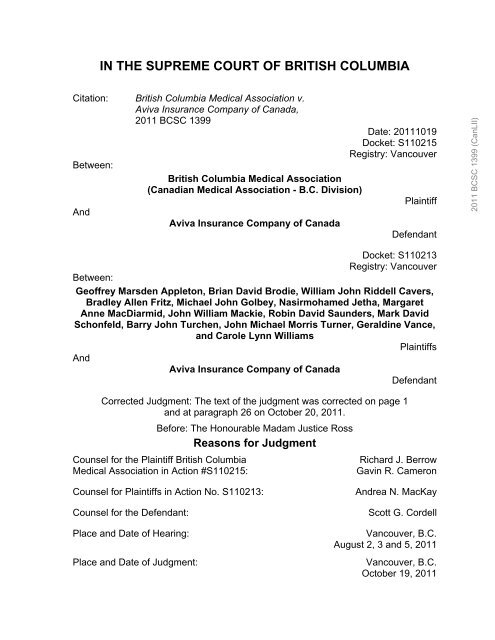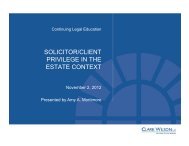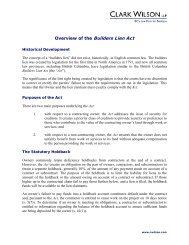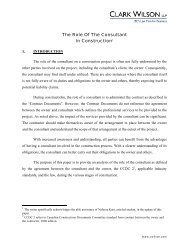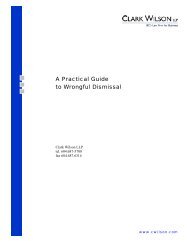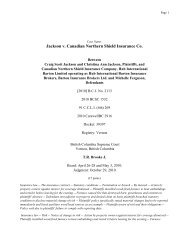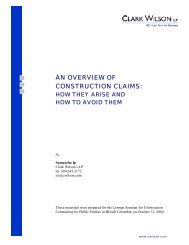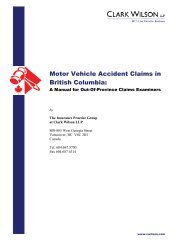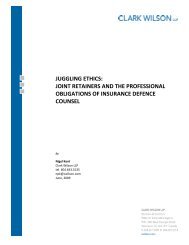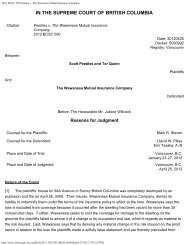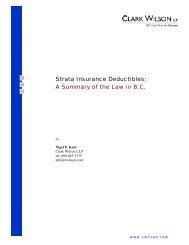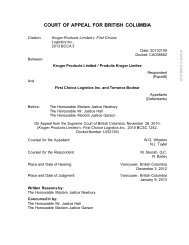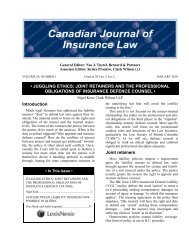in the supreme court of british columbia - Clark Wilson LLP
in the supreme court of british columbia - Clark Wilson LLP
in the supreme court of british columbia - Clark Wilson LLP
You also want an ePaper? Increase the reach of your titles
YUMPU automatically turns print PDFs into web optimized ePapers that Google loves.
IN THE SUPREME COURT OF BRITISH COLUMBIA<br />
Citation: British Columbia Medical Association v.<br />
Aviva Insurance Company <strong>of</strong> Canada,<br />
2011 BCSC 1399<br />
Between:<br />
And<br />
British Columbia Medical Association<br />
(Canadian Medical Association - B.C. Division)<br />
Aviva Insurance Company <strong>of</strong> Canada<br />
Date: 20111019<br />
Docket: S110215<br />
Registry: Vancouver<br />
Pla<strong>in</strong>tiff<br />
Defendant<br />
2011 BCSC 1399 (CanLII)<br />
Docket: S110213<br />
Registry: Vancouver<br />
Between:<br />
Ge<strong>of</strong>frey Marsden Appleton, Brian David Brodie, William John Riddell Cavers,<br />
Bradley Allen Fritz, Michael John Golbey, Nasirmohamed Jetha, Margaret<br />
Anne MacDiarmid, John William Mackie, Rob<strong>in</strong> David Saunders, Mark David<br />
Schonfeld, Barry John Turchen, John Michael Morris Turner, Gerald<strong>in</strong>e Vance,<br />
and Carole Lynn Williams<br />
Pla<strong>in</strong>tiffs<br />
And<br />
Aviva Insurance Company <strong>of</strong> Canada<br />
Defendant<br />
Corrected Judgment: The text <strong>of</strong> <strong>the</strong> judgment was corrected on page 1<br />
and at paragraph 26 on October 20, 2011.<br />
Before: The Honourable Madam Justice Ross<br />
Reasons for Judgment<br />
Counsel for <strong>the</strong> Pla<strong>in</strong>tiff British Columbia<br />
Medical Association <strong>in</strong> Action #S110215:<br />
Richard J. Berrow<br />
Gav<strong>in</strong> R. Cameron<br />
Counsel for Pla<strong>in</strong>tiffs <strong>in</strong> Action No. S110213:<br />
Counsel for <strong>the</strong> Defendant:<br />
Place and Date <strong>of</strong> Hear<strong>in</strong>g:<br />
Place and Date <strong>of</strong> Judgment:<br />
Andrea N. MacKay<br />
Scott G. Cordell<br />
Vancouver, B.C.<br />
August 2, 3 and 5, 2011<br />
Vancouver, B.C.<br />
October 19, 2011
British Columbia Medical Association v. Aviva Insurance<br />
Company <strong>of</strong> Canada Page 2<br />
Introduction<br />
[1] These actions are <strong>the</strong> result <strong>of</strong> a coverage dispute between <strong>the</strong> <strong>in</strong>surer Aviva<br />
Insurance Company <strong>of</strong> Canada (“Aviva”), and both <strong>the</strong> British Columbia Medical<br />
Association (Canadian Medical Association - B.C. Division) (“BCMA” and <strong>the</strong> pla<strong>in</strong>tiff<br />
<strong>in</strong> Action No. S110215), and Ge<strong>of</strong>frey Marsden Appleton, Brian David Brodie,<br />
William John Riddell Cavers, Bradley Allen Fritz, Michael John Golbey,<br />
Nasirmohamed Jetha, Margaret Anne MacDiarmid, John William Mackie, Rob<strong>in</strong><br />
David Saunders, Mark David Schonfeld, Barry John Turchen, John Michael Morris<br />
Turner, Gerald<strong>in</strong>e Vance and Carole Lynn Williams (<strong>the</strong> “Individuals” and <strong>the</strong><br />
pla<strong>in</strong>tiffs <strong>in</strong> Action No. S110213). It is common ground that BCMA and <strong>the</strong><br />
Individuals (<strong>the</strong> “Insured”) are <strong>in</strong>sured under several policies issued by Aviva.<br />
2011 BCSC 1399 (CanLII)<br />
[2] The coverage dispute relates to an action brought by Dr. Carol<strong>in</strong>e Wang, a<br />
former member <strong>of</strong> <strong>the</strong> BCMA board, aga<strong>in</strong>st <strong>the</strong> Insured (<strong>the</strong> “Underly<strong>in</strong>g Action”). In<br />
<strong>the</strong> Underly<strong>in</strong>g Action, Dr. Wang alleges that <strong>the</strong> defendants defamed her on<br />
numerous occasions. The defamatory publications were said to be part <strong>of</strong> a<br />
“campaign <strong>of</strong> vilification”, published by <strong>the</strong> defendants with an <strong>in</strong>tent to <strong>in</strong>jure her and<br />
with knowledge <strong>of</strong> <strong>the</strong>ir falsity.<br />
[3] The relevant <strong>in</strong>surance provides for coverage for defamation claims, but<br />
excludes coverage for acts <strong>of</strong> <strong>in</strong>tentional wrongdo<strong>in</strong>g. The Insured have taken <strong>the</strong><br />
position that Aviva has a duty to provide a defence for both BCMA and <strong>the</strong><br />
Individuals because <strong>the</strong> Statements <strong>of</strong> Claim <strong>in</strong> <strong>the</strong> underly<strong>in</strong>g action all conta<strong>in</strong> a<br />
plead<strong>in</strong>g <strong>of</strong> defamation. Hence, <strong>the</strong>y submit that <strong>the</strong>re is a prospect that Dr. Wang<br />
could recover at trial for defamation simpliciter, absent a f<strong>in</strong>d<strong>in</strong>g <strong>of</strong> <strong>in</strong>tentional<br />
wrongdo<strong>in</strong>g by any or all <strong>of</strong> <strong>the</strong> defendants.<br />
[4] Aviva has taken <strong>the</strong> position that because Dr. Wang has alleged that all <strong>of</strong> <strong>the</strong><br />
defamatory publications were published with <strong>the</strong> <strong>in</strong>tention to harm and with<br />
knowledge that <strong>the</strong>y are false, <strong>the</strong> claims aga<strong>in</strong>st <strong>the</strong> Insured with respect to direct<br />
liability are excluded from coverage. Accord<strong>in</strong>gly, Aviva says <strong>the</strong>re is no duty to<br />
defend <strong>the</strong> Insured on this basis. Aviva acknowledges <strong>the</strong> plead<strong>in</strong>g that BCMA is
British Columbia Medical Association v. Aviva Insurance<br />
Company <strong>of</strong> Canada Page 3<br />
vicariously liable for <strong>the</strong> Individuals’ acts imposes a duty on <strong>the</strong>m to defend BCMA <strong>in</strong><br />
that regard.<br />
[5] The second issue is with respect to <strong>the</strong> control <strong>of</strong> <strong>the</strong> defence. The Insured<br />
assert that Aviva and <strong>the</strong> Insured are <strong>in</strong> a position <strong>of</strong> conflict aris<strong>in</strong>g from conduct<br />
that will be litigated <strong>in</strong> <strong>the</strong> Underly<strong>in</strong>g Action. In <strong>the</strong>ir submission, it follows that Aviva<br />
is not entitled to control <strong>the</strong> defence. Aviva asserts that <strong>the</strong>re is no conflict that would<br />
necessitate <strong>the</strong> loss <strong>of</strong> <strong>the</strong>ir ability to control <strong>the</strong> defence.<br />
Relief Sought<br />
[6] There are three applications before <strong>the</strong> Court, each seek<strong>in</strong>g summary<br />
judgment pursuant to Rule 9-7:<br />
2011 BCSC 1399 (CanLII)<br />
(a)<br />
<strong>the</strong> Individuals seek <strong>the</strong> follow<strong>in</strong>g relief:<br />
1. A declaration that <strong>the</strong> Respondent Aviva Insurance Company <strong>of</strong><br />
Canada (“Aviva”) is, and at all material times has been, under an<br />
obligation to pay for <strong>the</strong> defence <strong>of</strong> certa<strong>in</strong> directors, executive <strong>of</strong>ficers,<br />
employees and volunteer workers <strong>of</strong> <strong>the</strong> British Columbia Medical<br />
Association (“BCMA”), namely Ge<strong>of</strong>frey Marsden Appleton, Brian<br />
David Brodie, William John Riddell Cavers, Bradley Allen Fritz, Michael<br />
John Golbey, Nasirmohamed Jetha, Margaret Anne MacDiarmid, John<br />
William Mackie, Rob<strong>in</strong> David Saunders, Mark David Schonfeld, Barry<br />
John Turchen, John Michael Morris Turner and Gerald<strong>in</strong>e Vance (<strong>the</strong><br />
“Individuals”) aga<strong>in</strong>st <strong>the</strong> claims brought aga<strong>in</strong>st <strong>the</strong>m by Carol<strong>in</strong>e<br />
Wang as set out <strong>in</strong> <strong>the</strong> Statement <strong>of</strong> Claim filed August 7, 2009 <strong>in</strong> <strong>the</strong><br />
Supreme Court <strong>of</strong> British Columbia, Vancouver Registry Action No,<br />
509577 (<strong>the</strong> “Wang Action”), and as set out <strong>in</strong> <strong>the</strong> Consolidated Notice<br />
<strong>of</strong> Civil Claim filed September 27, 2010 <strong>in</strong> <strong>the</strong> Wang Action (toge<strong>the</strong>r,<br />
<strong>the</strong> “Claims”).
British Columbia Medical Association v. Aviva Insurance<br />
Company <strong>of</strong> Canada Page 4<br />
2. A declaration that Aviva is not entitled to exercise any right to<br />
control or participate <strong>in</strong> <strong>the</strong> defence <strong>of</strong> <strong>the</strong> Individuals aga<strong>in</strong>st <strong>the</strong><br />
Claims.<br />
(b)<br />
3. A declaration that Aviva is not entitled to exercise any right that<br />
it might o<strong>the</strong>rwise have enjoyed <strong>in</strong> connection with <strong>the</strong> conduct <strong>of</strong> <strong>the</strong><br />
defence <strong>of</strong> <strong>the</strong> Individuals aga<strong>in</strong>st <strong>the</strong> Claims, <strong>in</strong>clud<strong>in</strong>g as to <strong>the</strong><br />
approval <strong>of</strong> any defence costs or settlement opportunity.<br />
BCMA seeks <strong>the</strong> follow<strong>in</strong>g relief:<br />
1. A declaration that <strong>the</strong> Respondent Aviva Insurance Company <strong>of</strong><br />
Canada (“Aviva”) is, and at all material times has been, under an<br />
obligation to <strong>the</strong> British Columbia Medical Association (“BCMA”) to pay<br />
for <strong>the</strong> defence <strong>of</strong> BCMA and certa<strong>in</strong> <strong>of</strong> its directors, executive <strong>of</strong>ficers,<br />
employees and volunteer workers, namely Ge<strong>of</strong>frey Marsden<br />
Appleton, Brian David Brodie, William John Riddell Cavers, Bradley<br />
Allen Fritz, Michael John Golbey, Nasirmohamed Jetha, Margaret<br />
Anne MacDiarmid, John William Mackie, Rob<strong>in</strong> David Saunders, Mark<br />
David Schonfeld, Barry John Turchen, John Michael Morris Turner and<br />
Gerald<strong>in</strong>e Vance (<strong>the</strong> “Individuals”) aga<strong>in</strong>st <strong>the</strong> claims brought aga<strong>in</strong>st<br />
<strong>the</strong>m by Carol<strong>in</strong>e Wang as set out <strong>in</strong> <strong>the</strong> Statement <strong>of</strong> Claim filed<br />
August 7, 2009 <strong>in</strong> <strong>the</strong> Supreme Court <strong>of</strong> British Columbia, Vancouver<br />
Registry Action No. S09577 (<strong>the</strong> “Wang Action”), and as set out <strong>in</strong> <strong>the</strong><br />
Consolidated Notice <strong>of</strong> Civil Claim filed September 27, 2010 <strong>in</strong> <strong>the</strong><br />
Wang Action (toge<strong>the</strong>r, <strong>the</strong> “Claims”).<br />
2011 BCSC 1399 (CanLII)<br />
2. A declaration that Aviva is not entitled to exercise any right to<br />
control or participate <strong>in</strong> <strong>the</strong> defence <strong>of</strong> BCMA and <strong>the</strong> Individuals<br />
aga<strong>in</strong>st <strong>the</strong> Claims.<br />
3. A declaration that Aviva is not entitled to exercise any right that<br />
it might o<strong>the</strong>rwise have enjoyed <strong>in</strong> connection with <strong>the</strong> conduct <strong>of</strong> <strong>the</strong>
British Columbia Medical Association v. Aviva Insurance<br />
Company <strong>of</strong> Canada Page 5<br />
defence <strong>of</strong> BCMA and <strong>the</strong> Individuals aga<strong>in</strong>st <strong>the</strong> Claims, <strong>in</strong>clud<strong>in</strong>g as<br />
to <strong>the</strong> approval <strong>of</strong> any defence costs or settlement opportunity.<br />
(c)<br />
Aviva seeks <strong>the</strong> follow<strong>in</strong>g relief:<br />
1. A declaration Aviva is not responsible for any defence costs<br />
<strong>in</strong>curred by BCMA <strong>in</strong> respect <strong>of</strong> Vancouver Registry Action<br />
No. S095777 (<strong>the</strong> “Underly<strong>in</strong>g Proceed<strong>in</strong>g”) from January 13, 2010 to<br />
<strong>the</strong> date <strong>of</strong> this application.<br />
2. A declaration Aviva does not owe a duty to defend BCMA<br />
pursuant to <strong>the</strong> Aviva Policies with respect to those claims made<br />
aga<strong>in</strong>st BCMA <strong>in</strong> <strong>the</strong> Consolidated Notice <strong>of</strong> Civil Claim filed<br />
September 27, 2010 <strong>in</strong> <strong>the</strong> Underly<strong>in</strong>g Proceed<strong>in</strong>g, o<strong>the</strong>r than <strong>the</strong><br />
claim it is vicariously liable for Unlawful Expression.<br />
2011 BCSC 1399 (CanLII)<br />
3. A declaration Aviva has <strong>the</strong> right to direct and control <strong>the</strong><br />
defence <strong>of</strong> BCMA <strong>in</strong> <strong>the</strong> Underly<strong>in</strong>g Proceed<strong>in</strong>g, and <strong>the</strong> right to select<br />
and reta<strong>in</strong> counsel <strong>of</strong> its choice pursuant to <strong>the</strong> Build<strong>in</strong>g Policy, subject<br />
to its reservation <strong>of</strong> rights and BCMA’s right to associate <strong>in</strong> <strong>the</strong><br />
Defence.<br />
4. A declaration <strong>the</strong> cost <strong>of</strong> defend<strong>in</strong>g BCMA <strong>in</strong> <strong>the</strong> Underly<strong>in</strong>g<br />
Proceed<strong>in</strong>gs be apportioned between Aviva, BCMA, and/or BCMA’s<br />
o<strong>the</strong>r <strong>in</strong>surers, at <strong>the</strong> conclusion <strong>of</strong> <strong>the</strong> Underly<strong>in</strong>g Proceed<strong>in</strong>g.<br />
Facts<br />
The Parties<br />
[7] BCMA is a voluntary association <strong>of</strong> British Columbia's physicians, medical<br />
residents, and medical students. It has over 11,000 members with about 8,500<br />
<strong>in</strong>active medical practitioners, represent<strong>in</strong>g approximately 95% <strong>of</strong> practic<strong>in</strong>g<br />
physicians <strong>in</strong> British Columbia. BCMA is governed by a Board <strong>of</strong> Directors, currently<br />
consist<strong>in</strong>g <strong>of</strong> 37 members. Its work is carried out and supported by its Officers, and
British Columbia Medical Association v. Aviva Insurance<br />
Company <strong>of</strong> Canada Page 6<br />
an Executive Committee <strong>of</strong> <strong>the</strong> Board, consist<strong>in</strong>g <strong>of</strong> <strong>the</strong> Officers, two elected<br />
Directors, and <strong>the</strong> elected Chair <strong>of</strong> <strong>the</strong> Board, work<strong>in</strong>g with <strong>the</strong> CEO and o<strong>the</strong>r senior<br />
staff. The governance structure <strong>of</strong> BCMA <strong>in</strong>cludes a number <strong>of</strong> committees,<br />
<strong>in</strong>clud<strong>in</strong>g <strong>the</strong> Audit and F<strong>in</strong>ance Committee, Governance and Nom<strong>in</strong>at<strong>in</strong>g<br />
Committee, Human Resources and Compensation Committee, Negotiat<strong>in</strong>g<br />
Committee, Tariff Committee and Review Committee.<br />
[8] BCMA negotiates on behalf <strong>of</strong> physicians for <strong>the</strong>ir compensation. It is also<br />
responsible for sett<strong>in</strong>g medical service fee schedules and negotiat<strong>in</strong>g schedules <strong>of</strong><br />
benefits paid by <strong>the</strong> Medical Services Plan, as well as represent<strong>in</strong>g sessional,<br />
salaried, and o<strong>the</strong>r alternate payment physicians. BCMA has a role with respect to<br />
efforts to improve medical education, health care legislation, and <strong>the</strong> delivery <strong>of</strong><br />
hospital and o<strong>the</strong>r healthcare services. Meet<strong>in</strong>gs <strong>of</strong> <strong>the</strong> Board and o<strong>the</strong>r bodies<br />
with<strong>in</strong> <strong>the</strong> governance structure <strong>of</strong> BCMA, <strong>in</strong>clud<strong>in</strong>g <strong>the</strong> General Assembly, <strong>in</strong>volve<br />
discussion and debate about <strong>the</strong> affairs <strong>of</strong> BCMA and its members, <strong>in</strong>clud<strong>in</strong>g <strong>the</strong><br />
manner <strong>in</strong> which physicians <strong>in</strong> different areas <strong>of</strong> practice are to be compensated,<br />
and <strong>the</strong> conduct <strong>of</strong> negotiations between BCMA and <strong>the</strong> prov<strong>in</strong>cial government<br />
concern<strong>in</strong>g compensation.<br />
2011 BCSC 1399 (CanLII)<br />
[9] The Individuals are certa<strong>in</strong> executive <strong>of</strong>ficers, directors, employees and<br />
volunteers <strong>of</strong> BCMA who were named as defendants <strong>in</strong> <strong>the</strong> Underly<strong>in</strong>g Action.<br />
[10] BCMA has had a relationship with Aviva and its predecessors s<strong>in</strong>ce 2002.<br />
BCMA purchased <strong>in</strong>surance coverage from Aviva for its own benefit and for that <strong>of</strong><br />
its directors, <strong>of</strong>ficers, and o<strong>the</strong>rs. The <strong>in</strong>surance coverage was purchased through<br />
an <strong>in</strong>surance brokerage firm known as Mardon Group Insurance (“Mardon”).<br />
The Policies<br />
[11] The applications <strong>of</strong> <strong>the</strong> Insured address <strong>the</strong> commercial general liability<br />
coverage (“CGL”) under three Aviva policies: <strong>the</strong> BCMA Package Program Policy;<br />
<strong>the</strong> Commercial Umbrella Policy; and <strong>the</strong> Prime Realty Policy. (collectively, <strong>the</strong><br />
“Aviva Policies”).
British Columbia Medical Association v. Aviva Insurance<br />
Company <strong>of</strong> Canada Page 7<br />
[12] The key terms <strong>of</strong> <strong>the</strong> Aviva Policies are:<br />
(a) <strong>the</strong> coverage grant for third party claims alleg<strong>in</strong>g libel, slander, or<br />
disparagement <strong>of</strong> a person’s services, <strong>in</strong>clud<strong>in</strong>g <strong>the</strong> duty to defend such<br />
claims,<br />
(b) exclusions for know<strong>in</strong>g violation <strong>of</strong> <strong>the</strong> rights <strong>of</strong> ano<strong>the</strong>r, publication<br />
with knowledge <strong>of</strong> falsity, and breach <strong>of</strong> contract.<br />
[13] Pursuant to <strong>the</strong> CGL sections <strong>of</strong> <strong>the</strong> Aviva Policies, <strong>the</strong> Insured enjoy<br />
coverage <strong>in</strong> respect <strong>of</strong> claims aga<strong>in</strong>st <strong>the</strong>m for, <strong>in</strong>ter alia, “Personal and Advertis<strong>in</strong>g<br />
<strong>in</strong>jury”, which is def<strong>in</strong>ed <strong>in</strong> each <strong>of</strong> <strong>the</strong> Aviva Policies as:<br />
2011 BCSC 1399 (CanLII)<br />
“Personal and advertis<strong>in</strong>g <strong>in</strong>jury” means <strong>in</strong>jury, <strong>in</strong>clud<strong>in</strong>g consequential<br />
“bodily <strong>in</strong>jury”, aris<strong>in</strong>g out <strong>of</strong> one or more <strong>of</strong> <strong>the</strong> follow<strong>in</strong>g <strong>of</strong>fenses:<br />
(a) False arrest, detention or imprisonment;<br />
(b) Malicious prosecution;<br />
(c) The wrongful eviction from, wrongful entry <strong>in</strong>to, or <strong>in</strong>vasion <strong>of</strong> <strong>the</strong> right<br />
<strong>of</strong> private occupancy <strong>of</strong> a room, dwell<strong>in</strong>g or premises that a person<br />
occupies, committed by or on behalf <strong>of</strong> its owner, landlord or lessor;<br />
(d) Oral or written publication, <strong>in</strong> any manner, <strong>of</strong> material that slanders or<br />
libels a person or organization or disparages a person’s or<br />
organization’s goods, products or services;<br />
(e) Oral or written publication, <strong>in</strong> any manner, <strong>of</strong> material that violates a<br />
person’s right <strong>of</strong> privacy;<br />
(f) The use <strong>of</strong> ano<strong>the</strong>r’s advertis<strong>in</strong>g idea <strong>in</strong> your “advertisement”; or<br />
(g) Infr<strong>in</strong>g<strong>in</strong>g upon ano<strong>the</strong>r’s copyright, trade dress or slogan <strong>in</strong> your<br />
“advertisement”).<br />
[14] In particular, <strong>the</strong> Aviva Policies provide coverage for Personal and Advertis<strong>in</strong>g<br />
<strong>in</strong>jury as follows:<br />
COVERAGE B - PERSONAL and ADVERTISING INJURY LIABILITY<br />
1. Insur<strong>in</strong>g Agreement<br />
(a) We will pay those sums that <strong>the</strong> <strong>in</strong>sured becomes legally obligated to<br />
pay as “compensatory damages” because <strong>of</strong> “personal and advertis<strong>in</strong>g <strong>in</strong>jury”<br />
to which this <strong>in</strong>surance applies. We will have <strong>the</strong> right and duty to defend <strong>the</strong><br />
<strong>in</strong>sured aga<strong>in</strong>st any “action” seek<strong>in</strong>g those “compensatory damages”.<br />
However, we will have no duty to defend <strong>the</strong> <strong>in</strong>sured aga<strong>in</strong>st any “action”<br />
seek<strong>in</strong>g “compensatory damages” for “personal and advertis<strong>in</strong>g <strong>in</strong>jury” to
British Columbia Medical Association v. Aviva Insurance<br />
Company <strong>of</strong> Canada Page 8<br />
which this <strong>in</strong>surance does not apply. We may, at our discretion, <strong>in</strong>vestigate<br />
any <strong>of</strong>fense and settle any claim or “action” that may result. ...<br />
(b) This <strong>in</strong>surance applies to “personal and advertis<strong>in</strong>g <strong>in</strong>jury” caused by<br />
an <strong>of</strong>fense aris<strong>in</strong>g out <strong>of</strong> your bus<strong>in</strong>ess but only if <strong>the</strong> <strong>of</strong>fense was committed<br />
<strong>in</strong> <strong>the</strong> “coverage territory” dur<strong>in</strong>g <strong>the</strong> policy period.<br />
2. Exclusions<br />
This <strong>in</strong>surance does not apply to:<br />
(a) Know<strong>in</strong>g violation <strong>of</strong> rights <strong>of</strong> ano<strong>the</strong>r “Personal and advertis<strong>in</strong>g <strong>in</strong>jury”<br />
caused by or at <strong>the</strong> direction <strong>of</strong> <strong>the</strong> <strong>in</strong>sured with <strong>the</strong> knowledge that <strong>the</strong> act<br />
would violate <strong>the</strong> rights <strong>of</strong> ano<strong>the</strong>r and would <strong>in</strong>flict “personal and advertis<strong>in</strong>g<br />
<strong>in</strong>jury”.<br />
(b) Material published with knowledge <strong>of</strong> falsity “Personal and advertis<strong>in</strong>g<br />
<strong>in</strong>jury” aris<strong>in</strong>g out <strong>of</strong> oral or written publication <strong>of</strong> material, if done by or at <strong>the</strong><br />
direction <strong>of</strong> <strong>the</strong> <strong>in</strong>sured with knowledge <strong>of</strong> its falsity.<br />
(f) Breach <strong>of</strong> Contract<br />
“Personal and advertis<strong>in</strong>g <strong>in</strong>jury” aris<strong>in</strong>g out <strong>of</strong> a breach <strong>of</strong> contract, except an<br />
implied contract to use ano<strong>the</strong>r’s advertis<strong>in</strong>g idea <strong>in</strong> your “advertisement”.<br />
2011 BCSC 1399 (CanLII)<br />
[15] The Aviva Policies def<strong>in</strong>e <strong>the</strong> terms “Compensatory damages” and “Action”,<br />
respectively, as follows:<br />
“Compensatory damages” means damages due or awarded <strong>in</strong> payment for<br />
actual <strong>in</strong>jury or economic loss. “Compensatory damages” does not <strong>in</strong>clude<br />
punitive or exemplary damages or <strong>the</strong> multiple portion <strong>of</strong> any multiplied<br />
damage awards.<br />
“Action” means a civil proceed<strong>in</strong>g <strong>in</strong> which “compensatory damages”<br />
because <strong>of</strong> “bodily <strong>in</strong>jury”, “property damage” or “personal and advertis<strong>in</strong>g<br />
<strong>in</strong>jury” [or an act, error or omission] to which this <strong>in</strong>surance applies are<br />
alleged . . .<br />
[16] In respect <strong>of</strong> <strong>the</strong> defence <strong>of</strong> claims, <strong>the</strong> Aviva Policies state that Aviva will<br />
have “<strong>the</strong> right and duty to defend <strong>the</strong> <strong>in</strong>sured aga<strong>in</strong>st any ‘action’ seek<strong>in</strong>g those<br />
‘Compensatory Damages’”, i.e. for “Personal and Advertis<strong>in</strong>g <strong>in</strong>jury”, exclud<strong>in</strong>g those<br />
“to which this <strong>in</strong>surance does not apply”.<br />
[17] The term “Coverage Territory” is def<strong>in</strong>ed <strong>in</strong> <strong>the</strong> BCMA Package Program<br />
Policy and <strong>the</strong> Realty Policies as:<br />
“Coverage territory” means:<br />
(a) Canada and <strong>the</strong> United States <strong>of</strong> America (<strong>in</strong>clud<strong>in</strong>g its<br />
territories and possessions).
British Columbia Medical Association v. Aviva Insurance<br />
Company <strong>of</strong> Canada Page 9<br />
[18] And <strong>the</strong> term “coverage territory” is def<strong>in</strong>ed <strong>in</strong> <strong>the</strong> Commercial Umbrella<br />
Policy as mean<strong>in</strong>g “anywhere <strong>in</strong> <strong>the</strong> world”.<br />
[19] For <strong>the</strong> purpose <strong>of</strong> CGL coverage, <strong>the</strong> Aviva Policies def<strong>in</strong>e “Insureds” as<br />
<strong>in</strong>clud<strong>in</strong>g directors, <strong>of</strong>ficers, employees, volunteer workers, and shareholders. For<br />
example, <strong>the</strong> BCMA Package Program Policy provides:<br />
SUB-SECTION 2 - WHO IS AN INSURED<br />
1. If you are:<br />
(d) An organization o<strong>the</strong>r than a partnership, limited liability partnership,<br />
jo<strong>in</strong>t venture or limited liability company, you are an <strong>in</strong>sured. Your “executive<br />
<strong>of</strong>ficers” and directors are <strong>in</strong>sureds, but only with respect to <strong>the</strong>ir duties as<br />
your <strong>of</strong>ficers or directors. Your shareholders are also <strong>in</strong>sureds, but only with<br />
respect to <strong>the</strong>ir liability as shareholders.<br />
2. Each <strong>of</strong> <strong>the</strong> follow<strong>in</strong>g is also an <strong>in</strong>sured with respect to all coverages<br />
except Coverage F — Employee Benefits Liability:<br />
(a) Your “volunteer workers” only while perform<strong>in</strong>g duties related to <strong>the</strong><br />
conduct <strong>of</strong> your bus<strong>in</strong>ess, or your “employees”, o<strong>the</strong>r than ei<strong>the</strong>r your<br />
“executive <strong>of</strong>ficers” (if you are an organization o<strong>the</strong>r than a partnership,<br />
limited liability partnership, jo<strong>in</strong>t venture or limited liability company) or your<br />
managers (if you are a limited liability company), but only for acts with<strong>in</strong> <strong>the</strong><br />
scope <strong>of</strong> <strong>the</strong>ir employment by your or while perform<strong>in</strong>g duties related to <strong>the</strong><br />
conduct <strong>of</strong> your bus<strong>in</strong>ess. However, none <strong>of</strong> <strong>the</strong>se “employees” or “volunteer<br />
workers” are <strong>in</strong>sured for:<br />
(1) “Bodily <strong>in</strong>jury” or “personal and advertis<strong>in</strong>g <strong>in</strong>jury”:<br />
(i) To you, to your partners or members (if you are a partnership, limited<br />
liability partnership or jo<strong>in</strong>t venture), to your members (if you are a limited<br />
liability company), to a “co-employee” while <strong>in</strong> <strong>the</strong> course <strong>of</strong> his or her<br />
employment or perform<strong>in</strong>g duties related to <strong>the</strong> conduct <strong>of</strong> your bus<strong>in</strong>ess, or<br />
to your o<strong>the</strong>r “volunteer workers” while perform<strong>in</strong>g duties related to <strong>the</strong><br />
conduct <strong>of</strong> your bus<strong>in</strong>ess;<br />
2011 BCSC 1399 (CanLII)<br />
[20] The Aviva Policies def<strong>in</strong>e <strong>the</strong> terms “executive <strong>of</strong>ficers”, “volunteer workers”<br />
and “employees” as follows:<br />
“Executive Officer” means a person hold<strong>in</strong>g any <strong>of</strong> <strong>the</strong> <strong>of</strong>ficer positions<br />
created by your charter, constitution, by-laws or any o<strong>the</strong>r similar govern<strong>in</strong>g<br />
document.<br />
“Employee” <strong>in</strong>cludes a “leased worker”. Employee does not <strong>in</strong>clude a<br />
“temporary worker”.<br />
“Volunteer worker” means a person who is not your “employee”, and who<br />
donates his or her work and acts at <strong>the</strong> direction <strong>of</strong> and with<strong>in</strong> <strong>the</strong> scope <strong>of</strong>
British Columbia Medical Association v. Aviva Insurance<br />
Company <strong>of</strong> Canada Page 10<br />
duties determ<strong>in</strong>ed by you, and is not paid a fee, salary or o<strong>the</strong>r compensation<br />
by you or anyone else for <strong>the</strong>ir work performed for you.<br />
The Underly<strong>in</strong>g Action and Coverage Dispute<br />
[21] In September 2008, Mardon provided David Porter <strong>of</strong> Advance Claims (<strong>the</strong><br />
outside adjuster appo<strong>in</strong>ted by Aviva), with notice that Dr. Wang was threaten<strong>in</strong>g to<br />
commence a defamation action aga<strong>in</strong>st BCMA and some <strong>of</strong> its directors.<br />
[22] Dr. Wang commenced <strong>the</strong> Underly<strong>in</strong>g Action by Writ <strong>of</strong> Summons and<br />
Statement <strong>of</strong> Claim filed August 7, 2009 (<strong>the</strong> “Initial Statement <strong>of</strong> Claim”). The<br />
defendants named are BCMA, <strong>the</strong> Individuals and a series <strong>of</strong> unknown defendants.<br />
Under <strong>the</strong> head<strong>in</strong>g “Campaign <strong>of</strong> Vilification Actuated by Malice and Bad Faith”,<br />
paras. 24 to 27 provided <strong>in</strong> part:<br />
2011 BCSC 1399 (CanLII)<br />
24. Commenc<strong>in</strong>g on or about February 2, 2008 <strong>the</strong> defendants have each <strong>in</strong><br />
bad faith engaged <strong>in</strong> a campaign <strong>of</strong> malicious public attacks on <strong>the</strong> pla<strong>in</strong>tiff<br />
characterized by <strong>the</strong> defamatory expression, <strong>in</strong>jurious falsehoods and<br />
negligent misstatements (collectively here<strong>in</strong>after referred to as <strong>the</strong> “Unlawful<br />
Expression”) particularized <strong>in</strong> paragraphs 57 to 174 <strong>of</strong> this statement <strong>of</strong> claim.<br />
25. The defendants and each <strong>of</strong> <strong>the</strong>m maliciously published <strong>the</strong> Unlawful<br />
Expression for which each is responsible with <strong>the</strong> knowledge that <strong>the</strong><br />
mean<strong>in</strong>gs conveyed by that expression were false, or alternatively, with<br />
reckless <strong>in</strong>difference whe<strong>the</strong>r those mean<strong>in</strong>gs were true or false.<br />
26. The defendants, and each <strong>of</strong> <strong>the</strong>m, have been guilty <strong>of</strong> reprehensible,<br />
<strong>in</strong>sult<strong>in</strong>g, high-handed, spiteful, malicious and oppressive conduct and such<br />
conduct by <strong>the</strong> defendants justifies <strong>the</strong> <strong>court</strong> <strong>in</strong> impos<strong>in</strong>g a substantial penalty<br />
<strong>of</strong> exemplary damages on <strong>the</strong> defendants plus an award <strong>of</strong> special costs <strong>in</strong><br />
favour <strong>of</strong> <strong>the</strong> pla<strong>in</strong>tiff, <strong>in</strong> addition to an award <strong>of</strong> general damages for <strong>in</strong>jury to<br />
reputation. The pla<strong>in</strong>tiff will rely upon <strong>the</strong> entire conduct <strong>of</strong> <strong>the</strong> defendants<br />
before and after <strong>the</strong> commencement <strong>of</strong> this action to <strong>the</strong> date <strong>of</strong> judgment <strong>in</strong><br />
this action.<br />
27. The said defendants published <strong>the</strong> Unlawful Expression for which each is<br />
responsible for <strong>the</strong> dom<strong>in</strong>ant purpose <strong>of</strong>:<br />
(i) Inflict<strong>in</strong>g <strong>in</strong>jury upon <strong>the</strong> pla<strong>in</strong>tiff because <strong>of</strong> personal spite or<br />
animosity, or a desire to obta<strong>in</strong> revenge; and/or<br />
(ii) destroy<strong>in</strong>g her reputation so that <strong>the</strong> pla<strong>in</strong>tiff would have no<br />
pr<strong>of</strong>essional and political credibility with <strong>the</strong> BCMA membership<br />
<strong>the</strong>reby.<br />
[23] Under <strong>the</strong> head<strong>in</strong>g “The Unlawful Expression - Particulars”, Dr. Wang alleged<br />
<strong>in</strong>stances <strong>of</strong> allegedly defamatory and disparag<strong>in</strong>g expressions published by various
British Columbia Medical Association v. Aviva Insurance<br />
Company <strong>of</strong> Canada Page 11<br />
defendants and one <strong>in</strong>stance <strong>of</strong> alleged slander. In <strong>the</strong> alternative, <strong>the</strong> publications<br />
are alleged to have constituted <strong>in</strong>jurious falsehoods. In <strong>the</strong> fur<strong>the</strong>r alternative,<br />
Dr. Wang pleaded that <strong>the</strong> publications were negligent misstatements. BCMA is<br />
alleged to be both directly and vicariously liable.<br />
[24] With respect to all <strong>of</strong> <strong>the</strong> <strong>in</strong>stances <strong>of</strong> Unlawful Expression, Dr. Wang<br />
pleaded:<br />
177. The Unlawful Publications compla<strong>in</strong>ed <strong>of</strong> <strong>in</strong> this statement <strong>of</strong> claim have<br />
caused <strong>in</strong>jury, loss and damage to <strong>the</strong> pla<strong>in</strong>tiff, and were deliberately<br />
calculated by <strong>the</strong> defendants to expose <strong>the</strong> pla<strong>in</strong>tiff to contempt, ridicule and<br />
hatred, and to cause o<strong>the</strong>r persons to shun or avoid <strong>the</strong> pla<strong>in</strong>tiff, and to lower<br />
<strong>the</strong> pla<strong>in</strong>tiff’s reputation <strong>in</strong> <strong>the</strong> eyes <strong>of</strong> right-th<strong>in</strong>k<strong>in</strong>g members <strong>of</strong> <strong>the</strong><br />
community.<br />
178. The defendants were motivated <strong>in</strong> publish<strong>in</strong>g <strong>the</strong> words compla<strong>in</strong>ed <strong>of</strong> <strong>in</strong><br />
this statement <strong>of</strong> claim and <strong>in</strong> <strong>the</strong>ir subsequent and related conduct, by actual<br />
and express malice, which <strong>in</strong>creased <strong>the</strong> <strong>in</strong>jury to <strong>the</strong> pla<strong>in</strong>tiff, and by<br />
<strong>in</strong>creas<strong>in</strong>g <strong>the</strong> mental distress and humiliation <strong>of</strong> <strong>the</strong> pla<strong>in</strong>tiff.<br />
2011 BCSC 1399 (CanLII)<br />
[25] Mardon provided <strong>the</strong> Initial Statement <strong>of</strong> Claim to Aviva through Mr. Porter, its<br />
adjuster.<br />
[26] The Insured denied all allegations <strong>of</strong> wrongdo<strong>in</strong>g. BCMA reta<strong>in</strong>ed Howard<br />
Shapray, Q.C. <strong>of</strong> <strong>the</strong> firm Shapray Cramer to defend it jo<strong>in</strong>tly with <strong>the</strong> Individuals.<br />
[27] The Statement <strong>of</strong> Claim was provided to Aviva sometime <strong>in</strong> October 2009. By<br />
letter dated January 13, 2010, Aviva, <strong>in</strong>ter alia:<br />
a. denied coverage to <strong>the</strong> Individual Defendants on <strong>the</strong> bases <strong>the</strong> claims<br />
aga<strong>in</strong>st <strong>the</strong>m related to damage caused <strong>in</strong>tentionally by a purposeful and<br />
malicious campaign to <strong>in</strong>jure Dr. Wang, or were derivative <strong>of</strong> such claims, and<br />
i. Aviva’s policies provided coverage only for fortuitous events;<br />
ii. <strong>the</strong> material <strong>in</strong>sur<strong>in</strong>g agreement <strong>in</strong> each Aviva policy required<br />
that <strong>the</strong> Unlawful Publication arise out <strong>of</strong> <strong>the</strong> conduct <strong>of</strong> BCMA’s<br />
bus<strong>in</strong>ess, and <strong>in</strong>tentionally caused damages result<strong>in</strong>g from a
British Columbia Medical Association v. Aviva Insurance<br />
Company <strong>of</strong> Canada Page 12<br />
purposeful and malicious campaign to <strong>in</strong>jure were not related to any<br />
bona fide object <strong>of</strong> BCMA.<br />
b. denied coverage to BCMA on <strong>the</strong> same bases, save for <strong>the</strong> Vicariously<br />
Liability Claim, for which it acknowledged a duty to defend;<br />
c. reserved its rights to deny coverage on a number <strong>of</strong> additional bases<br />
and <strong>in</strong>dicated it would be appo<strong>in</strong>t<strong>in</strong>g defence counsel to defend all <strong>of</strong> <strong>the</strong><br />
claims aga<strong>in</strong>st BCMA, associat<strong>in</strong>g with BCMA <strong>in</strong> <strong>the</strong> conduct <strong>of</strong> <strong>the</strong> defence,<br />
and reserv<strong>in</strong>g its rights to seek an apportionment <strong>of</strong> defence costs.<br />
2011 BCSC 1399 (CanLII)<br />
[28] Aviva identified Eric Dolden <strong>of</strong> <strong>the</strong> firm Dolden Wallace Folick <strong>LLP</strong> as <strong>the</strong><br />
counsel it wished to appo<strong>in</strong>t to defend BCMA.<br />
[29] On January 29, 2010, Mardon provided Aviva with <strong>the</strong> Court <strong>of</strong> Appeal<br />
Reasons <strong>in</strong> Wang v. BCMA, 2010 BCCA 43, issued <strong>in</strong> respect <strong>of</strong> an appeal <strong>of</strong> Wang<br />
v. BCMA, 2008 BCSC 1559.<br />
[30] By letter dated February 2, 2010, Aviva advised through its counsel that <strong>the</strong><br />
Reasons did not alter its position with respect to coverage.<br />
[31] On May 5, 2010, Mardon provided Aviva with a Writ <strong>of</strong> Summons and<br />
Statement <strong>of</strong> Claim <strong>in</strong> Carol<strong>in</strong>e Wang v BCMA, Registry No. S013019 (<strong>the</strong> “Breach<br />
<strong>of</strong> Contract Claim”). On July 6, 2010, Aviva denied coverage with respect to <strong>the</strong><br />
claims advanced <strong>in</strong> <strong>the</strong> Breach <strong>of</strong> Contract Claim.<br />
[32] By Order dated August 26, 2010, Mr. Justice Truscott ordered <strong>the</strong> Underly<strong>in</strong>g<br />
Proceed<strong>in</strong>g and <strong>the</strong> Breach <strong>of</strong> Contract Claim to be consolidated and a Consolidated<br />
Notice <strong>of</strong> Civil Claim filed. BCMA <strong>the</strong>n received a Consolidated Notice <strong>of</strong> Civil Claim<br />
dated September 27, 2010 (<strong>the</strong> “Current Plead<strong>in</strong>g”).<br />
[33] Mardon provided Aviva with <strong>the</strong> Current Plead<strong>in</strong>g on October 5, 2010. By<br />
email dated October 26, 2010, Aviva advised that <strong>the</strong> Current Plead<strong>in</strong>g did not alter<br />
Aviva’s position with respect to coverage.
British Columbia Medical Association v. Aviva Insurance<br />
Company <strong>of</strong> Canada Page 13<br />
[34] The Current Plead<strong>in</strong>g repeats allegations <strong>of</strong> a campaign <strong>of</strong> overt vilification<br />
which <strong>in</strong>cluded unlawful publications concern<strong>in</strong>g Dr. Wang. It alleges that <strong>the</strong><br />
unlawful publications were defamatory and constituted <strong>in</strong>jurious falsehoods.<br />
Negligence and negligent misstatement are no longer pleaded. Dr. Wang alleges<br />
that <strong>the</strong> defendants breached <strong>the</strong> provisions <strong>of</strong> <strong>the</strong> Society Act, R.S.B.C. 1996,<br />
c. 433 and <strong>the</strong> terms <strong>of</strong> <strong>the</strong> contract between BCMA and its members. Dr. Wang<br />
alleges that <strong>the</strong> defendants published <strong>the</strong> unlawful publications know<strong>in</strong>g <strong>the</strong>y were<br />
false or with reckless <strong>in</strong>difference to <strong>the</strong> truth.<br />
[35] Dr. Wang also pleads that <strong>the</strong> defendants published <strong>the</strong> unlawful publications<br />
for <strong>the</strong> dom<strong>in</strong>ant purpose <strong>of</strong> <strong>in</strong>jur<strong>in</strong>g Dr. Wang and or destroy<strong>in</strong>g her reputation.<br />
BCMA is alleged to be both directly and vicariously liable.<br />
2011 BCSC 1399 (CanLII)<br />
[36] By letter dated June 16, 2011, Aviva set out its position with respect to<br />
coverage. The letter stated <strong>in</strong> part:<br />
Aviva acknowledges receipt <strong>of</strong> <strong>the</strong> Consolidated Notice <strong>of</strong> Civil Claim (<strong>the</strong><br />
“Consolidated Action”) filed on September 27, 2010 consolidat<strong>in</strong>g B.C.S.C.<br />
Vancouver Registry Action No. S095777 (<strong>the</strong> “Orig<strong>in</strong>al Unlawful Expression<br />
Action”) with B.C.S.C. Vancouver Registry Action No. S103019 (<strong>the</strong> “Orig<strong>in</strong>al<br />
Breach <strong>of</strong> Contract Action”).<br />
Aviva is treat<strong>in</strong>g delivery <strong>of</strong> <strong>the</strong> Consolidated Action to it as a report <strong>of</strong> claim<br />
on behalf <strong>of</strong> <strong>the</strong> BCMA and each <strong>of</strong> <strong>the</strong> personal defendants named <strong>in</strong> <strong>the</strong><br />
Consolidated Action (<strong>the</strong> “Individual Defendants”), under each <strong>of</strong> <strong>the</strong> follow<strong>in</strong>g<br />
policies:<br />
1. Aviva Policy No. 81215079 (<strong>the</strong> “Doctor’s Office Policy”);<br />
2. Aviva Policy No. 81332521, which is an umbrella policy over<br />
<strong>the</strong> Doctor’s Office Policy (<strong>the</strong> “Umbrella Policy”);<br />
3. Aviva Prime Realty Policy No. REA 81357445 (<strong>the</strong> “Build<strong>in</strong>g<br />
Policy”); and<br />
4. Any applicable Homeowner Policy held by a personal<br />
Defendant <strong>in</strong> <strong>the</strong> Consolidated Action.<br />
Each <strong>of</strong> <strong>the</strong>se policies (referred to collectively as <strong>the</strong> “Aviva Policies”) was<br />
issued to <strong>the</strong> BCMA as <strong>the</strong> names <strong>in</strong>sured, and <strong>in</strong> effect at <strong>the</strong> material<br />
times...<br />
[37] Aviva reiterated <strong>the</strong> position it took <strong>in</strong> its letter <strong>of</strong> July 6, 2010 that <strong>the</strong>re was<br />
no coverage for <strong>the</strong> claim advanced for breach <strong>of</strong> contract.
British Columbia Medical Association v. Aviva Insurance<br />
Company <strong>of</strong> Canada Page 14<br />
[38] With respect to <strong>the</strong> claims <strong>in</strong> relation to <strong>the</strong> alleged Unlawful Publications,<br />
Aviva stated <strong>the</strong>re is no coverage under any <strong>of</strong> <strong>the</strong> Aviva Policies for <strong>the</strong> Unlawful<br />
Expression claims advanced aga<strong>in</strong>st <strong>the</strong> Individual Defendants <strong>in</strong> <strong>the</strong> Consolidated<br />
Action:<br />
These claims are for damage caused <strong>in</strong>tentionally by a purposeful and<br />
malicious campaign to <strong>in</strong>jure Dr. Wang and destroy her reputation. Coverage<br />
for <strong>the</strong> unlawful expression claims aga<strong>in</strong>st <strong>the</strong> Individual Defendants is<br />
vitiated by <strong>the</strong> doctr<strong>in</strong>e <strong>of</strong> fortuity. It falls to <strong>the</strong> each <strong>of</strong> Individual Defendants<br />
to defend all <strong>of</strong> <strong>the</strong> claims aga<strong>in</strong>st <strong>the</strong>m and pay any damages which may be<br />
awarded aga<strong>in</strong>st <strong>the</strong>m. Aviva will not be do<strong>in</strong>g so.<br />
For <strong>the</strong> same reason, <strong>the</strong>re is no coverage under any <strong>of</strong> <strong>the</strong> Aviva Policies for<br />
any <strong>of</strong> <strong>the</strong> unlawful expression claims advanced aga<strong>in</strong>st <strong>the</strong> BCMA, except<br />
for <strong>the</strong> Vicarious Liability Claim. No <strong>in</strong>demnity will be provided to <strong>the</strong> BCMA <strong>in</strong><br />
respect <strong>of</strong> <strong>the</strong> claims o<strong>the</strong>r than <strong>the</strong> Vicarious Liability Claim. The cost <strong>of</strong><br />
defend<strong>in</strong>g <strong>the</strong> claims o<strong>the</strong>r than <strong>the</strong> Vicarious Liability Claim is <strong>the</strong><br />
responsibility <strong>of</strong> <strong>the</strong> BCMA.<br />
Aviva’s coverage position rema<strong>in</strong>s consistent with its coverage position for<br />
<strong>the</strong> claims <strong>in</strong> <strong>the</strong> Orig<strong>in</strong>al Unlawful Expression Action, communicated to <strong>the</strong><br />
BCMA through Mardon Group Insurance <strong>in</strong> our correspondence <strong>of</strong> January<br />
13, 2010.<br />
Aviva cont<strong>in</strong>ues to assert that it has <strong>the</strong> right to control <strong>the</strong> defence <strong>of</strong> <strong>the</strong><br />
BCMA <strong>in</strong> <strong>the</strong> consolidated Action and seek an apportionment <strong>of</strong> defence<br />
costs.<br />
2011 BCSC 1399 (CanLII)<br />
Duty to Defend<br />
[39] The parties are <strong>in</strong> substantial agreement with respect to <strong>the</strong> relevant legal<br />
pr<strong>in</strong>ciples. The general pr<strong>in</strong>ciples concern<strong>in</strong>g <strong>the</strong> <strong>in</strong>terpretation <strong>of</strong> <strong>in</strong>surance policies<br />
were set out by <strong>the</strong> Supreme Court <strong>of</strong> Canada <strong>in</strong> Progressive Homes Ltd. v.<br />
Lombard General Insurance Co. <strong>of</strong> Canada, 2010 SCC 33 [Progressive], at<br />
paras. 22-24. I have summarized some <strong>of</strong> <strong>the</strong>m here:<br />
(a)<br />
(b)<br />
<strong>the</strong> primary <strong>in</strong>terpretive pr<strong>in</strong>ciple is that when <strong>the</strong> policy is<br />
unambiguous, <strong>the</strong> <strong>court</strong> should give effect to <strong>the</strong> clear language <strong>of</strong> <strong>the</strong><br />
policy, read<strong>in</strong>g <strong>the</strong> policy as a whole. The focus <strong>of</strong> <strong>the</strong> exercise is on<br />
<strong>the</strong> language <strong>of</strong> <strong>the</strong> policy;<br />
where <strong>the</strong> language <strong>of</strong> <strong>the</strong> policy is ambiguous, <strong>the</strong> general rules <strong>of</strong><br />
contract construction are to be employed. These <strong>in</strong>clude preferr<strong>in</strong>g
British Columbia Medical Association v. Aviva Insurance<br />
Company <strong>of</strong> Canada Page 15<br />
constructions that are consistent with <strong>the</strong> reasonable expectations <strong>of</strong><br />
<strong>the</strong> parties, avoid<strong>in</strong>g constructions that would not have been <strong>in</strong> <strong>the</strong><br />
contemplation <strong>of</strong> <strong>the</strong> parties, and ensur<strong>in</strong>g that similar policies are<br />
<strong>in</strong>terpreted <strong>in</strong> a consistent fashion;<br />
(c) where <strong>the</strong>se rules <strong>of</strong> construction fail to resolve an ambiguity, <strong>the</strong><br />
pr<strong>in</strong>ciple <strong>of</strong> contra pr<strong>of</strong>erentem is applied aga<strong>in</strong>st <strong>the</strong> <strong>in</strong>surer. One<br />
corollary <strong>of</strong> this rule is that coverage provisions are to be construed<br />
broadly and exclusion clauses are to be given a narrow <strong>in</strong>terpretation.<br />
[40] Also, policies are to be <strong>in</strong>terpreted as <strong>the</strong>y would be understood by <strong>the</strong><br />
average person apply<strong>in</strong>g for <strong>in</strong>surance not as <strong>the</strong>y might be viewed by someone<br />
“versed <strong>in</strong> <strong>the</strong> niceties <strong>of</strong> <strong>in</strong>surance law” (see National Bank <strong>of</strong> Greece (Canada) v.<br />
Katsikonouris, [1990] 2 S.C.R. 1029 at p. 1043).<br />
2011 BCSC 1399 (CanLII)<br />
[41] The plead<strong>in</strong>gs govern <strong>the</strong> duty to provide a defence (see Monenco Ltd. v.<br />
Commonwealth Insurance Company, 2001 SCC 49 at para. 28). An <strong>in</strong>surer, under a<br />
liability policy stat<strong>in</strong>g a duty to defend, is required to provide for a defence where<br />
facts alleged <strong>in</strong> <strong>the</strong> plead<strong>in</strong>gs, if proven to be true, could require <strong>the</strong> <strong>in</strong>surer to<br />
<strong>in</strong>demnify <strong>the</strong> <strong>in</strong>sured for <strong>the</strong> claim. The duty is triggered by <strong>the</strong> mere possibility that<br />
a claim with<strong>in</strong> <strong>the</strong> policy may succeed (see Progressive and Nichols v. American<br />
Home Assurance Co. (1990), 68 D.L.R. (4 th ) 321 at p. 326 (S.C.C.)). In this regard, it<br />
is <strong>the</strong> true nature <strong>of</strong> <strong>the</strong> substance <strong>of</strong> <strong>the</strong> claim that is to be determ<strong>in</strong>ed, not <strong>the</strong><br />
particular labels used by <strong>the</strong> pleader (see Progressive and Conservation Council <strong>of</strong><br />
New Brunswick v. Encon Group, 2006 NBCA 51).<br />
[42] In Non-Mar<strong>in</strong>e Underwriters, Lloyd’s <strong>of</strong> London v. Scalera, [2000] 1 S.C.R.<br />
551 [Scalera], <strong>the</strong> Supreme Court <strong>of</strong> Canada outl<strong>in</strong>ed a three step process to be<br />
applied <strong>in</strong> determ<strong>in</strong><strong>in</strong>g whe<strong>the</strong>r a duty to provide a defence arises. First, <strong>the</strong> <strong>court</strong> is<br />
to determ<strong>in</strong>e if <strong>the</strong> pla<strong>in</strong>tiff’s legal allegations are properly pleaded. In do<strong>in</strong>g so <strong>the</strong><br />
<strong>court</strong> is to look beyond <strong>the</strong> choice <strong>of</strong> labels and exam<strong>in</strong>e <strong>the</strong> substance <strong>of</strong> <strong>the</strong><br />
allegations.
British Columbia Medical Association v. Aviva Insurance<br />
Company <strong>of</strong> Canada Page 16<br />
[43] The second stage is a determ<strong>in</strong>ation if any claims are entirely derivative <strong>in</strong><br />
nature. Where <strong>the</strong> plead<strong>in</strong>gs are found to conta<strong>in</strong> properly pleaded allegations <strong>of</strong><br />
both <strong>in</strong>tentional and non-<strong>in</strong>tentional torts, <strong>the</strong> <strong>court</strong> must decide whe<strong>the</strong>r <strong>the</strong> harm<br />
allegedly <strong>in</strong>flicted by <strong>the</strong> negligent conduct is derivative <strong>of</strong> that caused by <strong>the</strong><br />
<strong>in</strong>tentional conduct.<br />
[44] In this regard, a claim will be derivative where both torts arise from <strong>the</strong> same<br />
actions and cause <strong>the</strong> same harm. If <strong>the</strong> non-<strong>in</strong>tentional claim is found to be<br />
derivative, it will be subsumed <strong>in</strong>to <strong>the</strong> <strong>in</strong>tentional tort for <strong>the</strong> purpose <strong>of</strong> <strong>the</strong><br />
exclusion analysis. If <strong>the</strong> underly<strong>in</strong>g elements <strong>of</strong> <strong>the</strong> two claims are sufficiently<br />
disparate, <strong>the</strong> non-<strong>in</strong>tentional claim will not be derivative and <strong>the</strong> duty to defend will<br />
apply.<br />
2011 BCSC 1399 (CanLII)<br />
[45] The third stage is a determ<strong>in</strong>ation <strong>of</strong> whe<strong>the</strong>r <strong>the</strong>re are any properly pleaded,<br />
non-derivative claims that could fall under <strong>the</strong> policy’s coverage.<br />
[46] The Insured submit that <strong>the</strong> application <strong>of</strong> <strong>the</strong>se pr<strong>in</strong>ciples require Aviva to<br />
afford both BCMA and <strong>the</strong> Individuals with a defence to Dr. Wang’s claims. In<br />
particular, <strong>the</strong>y submit that:<br />
(a)<br />
(b)<br />
At all material times, BCMA was <strong>the</strong> “Named Insured”, and each <strong>of</strong><br />
BCMA and <strong>the</strong> Individuals were “Insureds” with<strong>in</strong> <strong>the</strong> mean<strong>in</strong>g <strong>of</strong> <strong>the</strong><br />
Aviva Policies.<br />
The Claims represent an “Action” aga<strong>in</strong>st BCMA and <strong>the</strong> Individuals for<br />
“compensatory damages” fall<strong>in</strong>g with<strong>in</strong> <strong>the</strong> coverage grants found <strong>in</strong><br />
<strong>the</strong> Aviva Policies, and <strong>in</strong> particular, with<strong>in</strong> <strong>the</strong> word<strong>in</strong>g <strong>of</strong> <strong>the</strong> coverage<br />
grant for claims alleg<strong>in</strong>g “[o]ral or written publication, <strong>in</strong> any manner, <strong>of</strong><br />
material that slanders or libels a person or organization or disparages<br />
a person’s or organization’s goods, products or services” and “aris<strong>in</strong>g<br />
out <strong>of</strong> [BCMA’s] bus<strong>in</strong>ess” (<strong>the</strong> “Disparagement Coverage”).
British Columbia Medical Association v. Aviva Insurance<br />
Company <strong>of</strong> Canada Page 17<br />
(c)<br />
Dr. Wang’s plead<strong>in</strong>gs allow for f<strong>in</strong>d<strong>in</strong>gs <strong>of</strong> liability aga<strong>in</strong>st <strong>the</strong><br />
Individuals and BCMA on a basis fall<strong>in</strong>g with<strong>in</strong> <strong>the</strong> Disparagement<br />
Coverage and not fall<strong>in</strong>g with<strong>in</strong> any <strong>of</strong> <strong>the</strong> exclusions.<br />
[47] Counsel for <strong>the</strong> Insured submits that <strong>the</strong> Statements <strong>of</strong> Claim each plead a<br />
claim <strong>of</strong> defamation aga<strong>in</strong>st BCMA and <strong>the</strong> Individuals. As discussed <strong>in</strong> Grant v.<br />
Torstar Corp., 2009 SCC 61, at paras. 28-29:<br />
A pla<strong>in</strong>tiff <strong>in</strong> a defamation action is required to prove three th<strong>in</strong>gs to obta<strong>in</strong><br />
judgment and an award <strong>of</strong> damages:<br />
(1) that <strong>the</strong> impugned words were defamatory, <strong>in</strong> <strong>the</strong> sense that<br />
<strong>the</strong>y would tend to lower <strong>the</strong> pla<strong>in</strong>tiff’s reputation <strong>in</strong> <strong>the</strong> eyes <strong>of</strong><br />
a reasonable person;<br />
(2) that <strong>the</strong> words <strong>in</strong> fact referred to <strong>the</strong> pla<strong>in</strong>tiff; and<br />
(3) that <strong>the</strong> words were published, mean<strong>in</strong>g that <strong>the</strong>y were<br />
communicated to at least one person o<strong>the</strong>r than <strong>the</strong> pla<strong>in</strong>tiff.<br />
If <strong>the</strong>se elements are established on a balance <strong>of</strong> probabilities, falsity and<br />
damage are presumed...The pla<strong>in</strong>tiff is not required to show that <strong>the</strong><br />
defendant <strong>in</strong>tended to do harm, or even that <strong>the</strong> defendant was careless. The<br />
tort is thus one <strong>of</strong> strict liability.<br />
If <strong>the</strong> pla<strong>in</strong>tiff proves <strong>the</strong> required elements, <strong>the</strong> onus <strong>the</strong>n shifts to <strong>the</strong><br />
defendant to advance a defence <strong>in</strong> order to escape liability.<br />
2011 BCSC 1399 (CanLII)<br />
[48] Defamation is a tort <strong>of</strong> strict liability, and <strong>in</strong> a defamation case, unless <strong>the</strong>re is<br />
a plea <strong>of</strong> privilege or fair comment, <strong>the</strong> law looks at <strong>the</strong> tendency and consequences<br />
<strong>of</strong> <strong>the</strong> publication, ra<strong>the</strong>r than <strong>the</strong> motive or <strong>in</strong>tention <strong>of</strong> <strong>the</strong> publisher. The <strong>court</strong> is<br />
not concerned with “what <strong>the</strong> motive <strong>of</strong> <strong>the</strong> person publish<strong>in</strong>g <strong>the</strong> libel was, or<br />
whe<strong>the</strong>r he <strong>in</strong>tended it to have libellous mean<strong>in</strong>g or not” (see Gatley on Libel and<br />
Slander, 11th ed. (London: Sweet & Maxwell, 2008) at pg. 14; Nevill v. F<strong>in</strong>e Arts Co.,<br />
[1895] 2 Q.B. 156 at p. 168 (Eng. C.A.); Newton v. Vancouver (City), [1932] 46<br />
B.C.R. 67 at p. 72 (C.A.)).<br />
[49] Counsel for <strong>the</strong> Insured notes that <strong>the</strong> exclusions <strong>in</strong> <strong>the</strong> Aviva Policies with<br />
respect to defamation or disparagement are “know<strong>in</strong>g violation <strong>of</strong> <strong>the</strong> rights <strong>of</strong><br />
ano<strong>the</strong>r” and publication “with knowledge <strong>of</strong> falsity”. However, a defamation pla<strong>in</strong>tiff<br />
does not have to show that <strong>the</strong> defendant had knowledge <strong>of</strong> <strong>the</strong> falsity <strong>of</strong> <strong>the</strong>
British Columbia Medical Association v. Aviva Insurance<br />
Company <strong>of</strong> Canada Page 18<br />
utterances or that <strong>the</strong> defendant had any blameworthy mental state <strong>in</strong> order to<br />
succeed. The Aviva Policies <strong>in</strong> this regard do not exclude <strong>in</strong>tentional publication.<br />
[50] The Insured submit that if <strong>the</strong>y were found liable for every <strong>in</strong>stance <strong>of</strong><br />
“Unlawful Expression” raised <strong>in</strong> <strong>the</strong> Consolidated Claim on <strong>the</strong> basis that <strong>the</strong>se<br />
words were defamatory or disparag<strong>in</strong>g <strong>of</strong> Dr. Wang, but <strong>the</strong>se words were not<br />
published with know<strong>in</strong>g falsity or with foreknowledge that <strong>the</strong> publication violated<br />
Dr. Wang’s rights, Aviva would be required to <strong>in</strong>demnify.<br />
[51] The Insured submit that even if <strong>the</strong> <strong>court</strong> were to f<strong>in</strong>d that <strong>the</strong> Insured were<br />
actuated by malice, Dr. Wang’s claims could still result <strong>in</strong> coverage for <strong>in</strong>demnity<br />
under <strong>the</strong> Aviva Policies. “Malice” can be established even where <strong>the</strong> defendants did<br />
not know <strong>the</strong> falsity <strong>of</strong> <strong>the</strong>ir statements, or did not know <strong>the</strong>y were violat<strong>in</strong>g <strong>the</strong><br />
pla<strong>in</strong>tiff’s rights. In Smith v. Cross, 2009 BCCA 529, Madam Justice Kirkpatrick says<br />
at para. 34:<br />
2011 BCSC 1399 (CanLII)<br />
A defendant is actuated by malice if he or she publishes <strong>the</strong> comment:<br />
i) Know<strong>in</strong>g it was false; or<br />
ii) With reckless <strong>in</strong>difference whe<strong>the</strong>r it is true or false; or<br />
iii) For <strong>the</strong> dom<strong>in</strong>ant purpose <strong>of</strong> <strong>in</strong>jur<strong>in</strong>g <strong>the</strong> pla<strong>in</strong>tiff because <strong>of</strong> spite or<br />
animosity; or<br />
iv) For some o<strong>the</strong>r dom<strong>in</strong>ant purpose which is improper or <strong>in</strong>direct, or<br />
also, if <strong>the</strong> occasion is privileged, for a dom<strong>in</strong>ant purpose not related<br />
to <strong>the</strong> occasion.<br />
[52] The Insured note that while <strong>the</strong> Current Plead<strong>in</strong>g conta<strong>in</strong>s allegations <strong>of</strong><br />
breach <strong>of</strong> contract, <strong>the</strong> alleged breaches are l<strong>in</strong>ked to <strong>the</strong> damage allegedly suffered<br />
because <strong>of</strong> <strong>the</strong> defamation. Therefore, <strong>the</strong> essential character <strong>of</strong> <strong>the</strong> claim is one <strong>of</strong><br />
defamation and disparagement.<br />
[53] Counsel cited a number <strong>of</strong> American decisions <strong>in</strong> which <strong>the</strong> plead<strong>in</strong>g <strong>of</strong><br />
<strong>in</strong>tentional misconduct did not relieve an <strong>in</strong>surer <strong>of</strong> <strong>the</strong> duty to defend where <strong>the</strong><br />
<strong>in</strong>sured could be found liable without pro<strong>of</strong> <strong>of</strong> <strong>in</strong>tentional misconduct; <strong>in</strong> o<strong>the</strong>r words,<br />
where <strong>the</strong> pla<strong>in</strong>tiff could succeed without prov<strong>in</strong>g <strong>in</strong>tentional misconduct (see Aearo<br />
Corporation v. American International Specialty L<strong>in</strong>es Insurance Company, 2009
British Columbia Medical Association v. Aviva Insurance<br />
Company <strong>of</strong> Canada Page 19<br />
U.S. Dist. LEXIS 117823, 676 F.Supp.2d 738 (S.D. Ind.); Orlando Nightclub<br />
Enterprises, Inc. v. James River Insurance Company, 2007 U.S. Dist. LEXIS 88320<br />
(M.D. Fla.); C<strong>in</strong>c<strong>in</strong>nati Insurance Company v. Trosch, 2008 U.S. App. LEXIS 5865,<br />
271 Fed. Appx. 205 (3rd Cir.) (apply<strong>in</strong>g Pennsylvania law); Park Place<br />
Enterta<strong>in</strong>ment Corporation v. Transcont<strong>in</strong>ental Insurance Company, 2002 U.S. Dist.<br />
LEXIS 18772, 225 F.Supp.2d 406 (S.D.N.Y.); Utica Mutual Insurance Company v.<br />
The David Agency Insurance, Inc., 2004 U.S. Dist. LEXIS 12434, 327 F.Supp.2d<br />
922 (N.D. Ill)).<br />
[54] Aviva submits that for <strong>the</strong> purpose <strong>of</strong> <strong>the</strong> present analysis, Dr. Wang’s<br />
Current Plead<strong>in</strong>g <strong>in</strong>cludes clear factual allegations that <strong>the</strong> Unlawful Expressions<br />
were part <strong>of</strong> a “campaign <strong>of</strong> vilification and malicious public attacks”, characterized<br />
by <strong>the</strong> Insured’s publications. Dr. Wang alleges that each <strong>in</strong>stance <strong>of</strong> publication<br />
occurred with those responsible act<strong>in</strong>g maliciously, know<strong>in</strong>g <strong>the</strong> mean<strong>in</strong>gs conveyed<br />
were false or not car<strong>in</strong>g if <strong>the</strong>y were, for <strong>the</strong> dom<strong>in</strong>ant purposes <strong>of</strong> <strong>in</strong>jur<strong>in</strong>g her and<br />
destroy<strong>in</strong>g her reputation.<br />
2011 BCSC 1399 (CanLII)<br />
[55] Aviva argues that <strong>the</strong> plead<strong>in</strong>gs must be taken as true, that <strong>the</strong>y are quite<br />
precise, and that <strong>the</strong>y do not <strong>in</strong>clude alternative plead<strong>in</strong>gs as to <strong>in</strong>tent. The<br />
gravamen <strong>of</strong> Dr. Wang’s compla<strong>in</strong>t is that <strong>the</strong> <strong>in</strong>dividual <strong>in</strong>tentional actions to <strong>in</strong>jure<br />
her were part <strong>of</strong> an organized effort to cause her <strong>the</strong> very harm for which relief is<br />
sought. In <strong>the</strong>se regards, <strong>the</strong> Current Plead<strong>in</strong>g is not materially different than <strong>the</strong><br />
claims advanced aga<strong>in</strong>st <strong>the</strong> Insured <strong>in</strong> <strong>the</strong> orig<strong>in</strong>al Statement <strong>of</strong> Claim.<br />
[56] Aviva does not dispute that an action <strong>in</strong> defamation may succeed without<br />
evidence that <strong>the</strong> defendant published defamatory words with <strong>in</strong>tention to <strong>in</strong>jure.<br />
However, it submits that <strong>in</strong> this case, Dr. Wang did plead such an <strong>in</strong>tention <strong>in</strong> clear<br />
and explicit terms. She alleges that everyth<strong>in</strong>g that occurred was part <strong>of</strong> a purposeful<br />
campaign to cause her <strong>the</strong> very <strong>in</strong>jury for which she is seek<strong>in</strong>g damages.<br />
[57] Counsel submits that <strong>the</strong> Insured’s submission <strong>in</strong> effect seeks to have <strong>the</strong><br />
<strong>court</strong> assume only some <strong>of</strong> <strong>the</strong> pleaded facts are true. However, it is submitted that
British Columbia Medical Association v. Aviva Insurance<br />
Company <strong>of</strong> Canada Page 20<br />
<strong>in</strong> conduct<strong>in</strong>g <strong>the</strong> analysis, <strong>the</strong> <strong>court</strong> must assume <strong>the</strong> truth <strong>of</strong> all <strong>of</strong> <strong>the</strong> factual<br />
allegations.<br />
[58] Aviva relied upon a number <strong>of</strong> American authorities which support <strong>the</strong><br />
proposition that claims <strong>of</strong> libel and slander which are alleged to be part <strong>of</strong> a<br />
deliberate and know<strong>in</strong>g plan to <strong>in</strong>jure, do not trigger a duty to defend under typical<br />
“personal <strong>in</strong>jury” word<strong>in</strong>gs. These typically recognize a dist<strong>in</strong>ction between an<br />
<strong>in</strong>tentional act and an <strong>in</strong>tended <strong>in</strong>jury, f<strong>in</strong>d<strong>in</strong>g <strong>the</strong>re is no coverage for defamation<br />
plead<strong>in</strong>gs related to <strong>the</strong> latter based upon explicit provisions recogniz<strong>in</strong>g <strong>the</strong> fortuity<br />
pr<strong>in</strong>cipal fundamental to every policy <strong>of</strong> liability <strong>in</strong>surance, or public policy<br />
considerations related to fortuity (see Insura Prop. & Cas. Ins. Co. v. Ashe, 2003 WL<br />
253255 (Tenn.Ct.App.); Monumental Life Insurance Company v. US F & G, 94 Md.<br />
App. 505 (1993); C<strong>in</strong>c<strong>in</strong>nati Ins. Co. v. Shanahan, 2008 WL 4426116 (C.D.Ill.);<br />
Cont<strong>in</strong>ental Casualty Co. v. Schaubel, 380 So.2d 483 (1980 Fla.App.3rd)).<br />
2011 BCSC 1399 (CanLII)<br />
[59] F<strong>in</strong>ally, Aviva submits that <strong>the</strong> allegations <strong>of</strong> negligence which were conta<strong>in</strong>ed<br />
<strong>in</strong> <strong>the</strong> orig<strong>in</strong>al Statement <strong>of</strong> Claim are derivative <strong>of</strong> <strong>the</strong> clear allegations <strong>of</strong> an<br />
<strong>in</strong>tentional campaign to <strong>in</strong>jure.<br />
[60] In my view, Aviva’s contention that, for purposes <strong>of</strong> <strong>the</strong> present analysis, <strong>the</strong><br />
<strong>court</strong> must proceed on <strong>the</strong> assumption that all <strong>the</strong> facts <strong>in</strong> <strong>the</strong> alleged underly<strong>in</strong>g<br />
Claim will be made out is overly restrictive. To my m<strong>in</strong>d, it is also <strong>in</strong>consistent with<br />
<strong>the</strong> pr<strong>in</strong>ciple reiterated by <strong>the</strong> <strong>court</strong> <strong>in</strong> Progressive that a duty to defend exists if<br />
<strong>the</strong>re is a possibility that <strong>the</strong> claims could fall with<strong>in</strong> <strong>the</strong> <strong>in</strong>surance coverage. I th<strong>in</strong>k<br />
that it is implicit <strong>in</strong> that test that <strong>in</strong> consider<strong>in</strong>g <strong>the</strong> issue, <strong>the</strong> <strong>court</strong> should address<br />
possible outcomes at trial based upon <strong>the</strong> claims alleged <strong>in</strong> <strong>the</strong> statement <strong>of</strong> claim.<br />
In o<strong>the</strong>r words, <strong>in</strong> order to determ<strong>in</strong>e if <strong>the</strong>re is a possibility <strong>of</strong> coverage, <strong>the</strong> <strong>court</strong><br />
should consider <strong>the</strong> possibility that some but not all <strong>of</strong> <strong>the</strong> pla<strong>in</strong>tiff’s allegations will<br />
succeed at trial.<br />
[61] I note that <strong>in</strong> Scalera, <strong>the</strong> majority <strong>in</strong> address<strong>in</strong>g <strong>the</strong> question <strong>of</strong> whe<strong>the</strong>r <strong>the</strong>re<br />
was a duty to defend considered what <strong>the</strong> possible outcomes could be and whe<strong>the</strong>r<br />
<strong>the</strong> policy provided coverage for ei<strong>the</strong>r eventuality. Conclud<strong>in</strong>g at paras. 43 and 44:
British Columbia Medical Association v. Aviva Insurance<br />
Company <strong>of</strong> Canada Page 21<br />
I conclude that <strong>the</strong>re is no justification <strong>in</strong> cases <strong>of</strong> battery <strong>of</strong> a sexual nature<br />
for depart<strong>in</strong>g from <strong>the</strong> traditional rule that <strong>the</strong> pla<strong>in</strong>tiff <strong>in</strong> a battery action must<br />
prove direct contact, at which po<strong>in</strong>t <strong>the</strong> onus shifts to <strong>the</strong> defendant to prove<br />
consent. To do so would be to place a burden upon pla<strong>in</strong>tiffs <strong>in</strong> battery<br />
actions <strong>of</strong> a sexual nature which pla<strong>in</strong>tiffs <strong>in</strong> o<strong>the</strong>r battery actions do not bear.<br />
I see nei<strong>the</strong>r <strong>the</strong> need nor <strong>the</strong> justification for do<strong>in</strong>g this on <strong>the</strong> material before<br />
us <strong>in</strong> this case.<br />
This said, I agree fully with Iacobucci J. that <strong>the</strong> law will not permit a<br />
defendant <strong>in</strong> an action for sexual battery to say that though he might be found<br />
to have committed <strong>the</strong> battery, he did not <strong>in</strong>tend any harm. This leaves <strong>the</strong><br />
defendant with two alternatives discussed <strong>in</strong> Williams, supra. Ei<strong>the</strong>r <strong>the</strong><br />
pla<strong>in</strong>tiff consented, <strong>in</strong> which case no action lies, or she did not consent and<br />
<strong>the</strong> defendant is deemed to have <strong>in</strong>tended to <strong>in</strong>jure her. In nei<strong>the</strong>r case does<br />
<strong>the</strong> policy provide coverage.<br />
2011 BCSC 1399 (CanLII)<br />
[62] Fur<strong>the</strong>r, <strong>in</strong> Scalera, Mr. Justice Iacobucci characterized <strong>the</strong> task as follows at<br />
paras. 93 and 94:<br />
Our task, <strong>the</strong>refore, is to decide which <strong>of</strong> <strong>the</strong> pla<strong>in</strong>tiff's legal allegations are<br />
properly pleaded, whe<strong>the</strong>r any <strong>of</strong> <strong>the</strong>m are derivative, and whe<strong>the</strong>r any <strong>of</strong> <strong>the</strong><br />
surviv<strong>in</strong>g claims ev<strong>in</strong>ce an <strong>in</strong>tention to <strong>in</strong>jure, thus trigger<strong>in</strong>g <strong>the</strong> exclusion<br />
clause. To do this, it is necessary to understand precisely what <strong>the</strong> elements<br />
<strong>of</strong> <strong>the</strong> various torts alleged aga<strong>in</strong>st <strong>the</strong> appellant are. If <strong>the</strong> elements <strong>of</strong> a tort<br />
claim require pro<strong>of</strong> <strong>of</strong> conduct that also proves an <strong>in</strong>tent to <strong>in</strong>jure, <strong>the</strong>re will be<br />
no duty to defend because any potentially successful claim would fall under<br />
<strong>the</strong> exclusion clause.<br />
As will be seen from <strong>the</strong> follow<strong>in</strong>g discussion, I conclude that each <strong>of</strong> <strong>the</strong><br />
pla<strong>in</strong>tiff's properly pleaded claims necessarily <strong>in</strong>volves an <strong>in</strong>tent to <strong>in</strong>jure,<br />
because each requires pro<strong>of</strong> that <strong>the</strong> appellant ei<strong>the</strong>r knew, or should have<br />
known, that <strong>the</strong> pla<strong>in</strong>tiff did not validly consent to sexual activity. Given this<br />
actual or constructive knowledge <strong>of</strong> non-consent, <strong>the</strong> law will not permit <strong>the</strong><br />
appellant to claim that he did not <strong>in</strong>tend any harm. The exclusion <strong>the</strong>refore<br />
applies because <strong>the</strong>re is no claim aga<strong>in</strong>st <strong>the</strong> appellant that, if successful,<br />
could potentially fall with<strong>in</strong> coverage. There be<strong>in</strong>g no potentially <strong>in</strong>demnifiable<br />
claim, <strong>the</strong> respondent has no duty to defend.<br />
[63] In The Co-operators General Insurance Company v, Morrison, 2004 NBCA 62<br />
[Morrison], <strong>the</strong> pla<strong>in</strong>tiff claimed for damages aris<strong>in</strong>g from a motor vehicle collision<br />
and subsequent assault at <strong>the</strong> hands <strong>of</strong> <strong>the</strong> defendant. The orig<strong>in</strong>al statement <strong>of</strong><br />
claim had alleged that both acts were <strong>in</strong>tentional. It was conceded that <strong>the</strong> orig<strong>in</strong>al<br />
statement <strong>of</strong> claim did not raise any claims which would be payable under <strong>the</strong><br />
<strong>in</strong>surance and hence <strong>the</strong>re would be no duty to defend. A subsequent amendment<br />
alleged that <strong>the</strong> collision was <strong>the</strong> result <strong>of</strong> negligence and <strong>the</strong>refore raised <strong>the</strong>
British Columbia Medical Association v. Aviva Insurance<br />
Company <strong>of</strong> Canada Page 22<br />
possibility that some or all <strong>of</strong> <strong>the</strong> damages susta<strong>in</strong>ed were caused by negligence<br />
with respect to <strong>the</strong> collision.<br />
[64] The Court concluded that <strong>the</strong>re was a duty to defend, reject<strong>in</strong>g <strong>the</strong><br />
submission that <strong>the</strong> negligence claim was purely derivative. The Court considered<br />
<strong>the</strong> possible outcomes at trial <strong>in</strong> <strong>the</strong> course <strong>of</strong> its analysis at para. 29:<br />
Hav<strong>in</strong>g said all this, I am not conv<strong>in</strong>ced that, <strong>in</strong> a case such as this, a pla<strong>in</strong>tiff<br />
could not claim that Mr. Morrison <strong>in</strong>tentionally caused <strong>the</strong> collision <strong>in</strong> an<br />
attempt to stop <strong>the</strong> Dedam vehicle from leav<strong>in</strong>g his property or, <strong>in</strong> <strong>the</strong><br />
alternative, that he caused <strong>the</strong> <strong>in</strong>juries by driv<strong>in</strong>g his vehicle <strong>in</strong> a negligent<br />
manner. It is arguable, <strong>in</strong> my view, that <strong>the</strong> two torts <strong>in</strong>volve different acts or<br />
conduct based upon Mr. Morrison's state <strong>of</strong> m<strong>in</strong>d, one be<strong>in</strong>g an <strong>in</strong>tentional<br />
tort and <strong>the</strong> o<strong>the</strong>r a non-<strong>in</strong>tentional tort. The Statement <strong>of</strong> Claim would<br />
obviously conta<strong>in</strong> a claim potentially with<strong>in</strong> coverage. At trial, <strong>the</strong> claim based<br />
upon <strong>the</strong> <strong>in</strong>tentional tort could fail and <strong>the</strong> negligence claim succeed. This is<br />
different from <strong>the</strong> allegations <strong>in</strong> Scalera where it was alleged <strong>in</strong> <strong>the</strong> Statement<br />
<strong>of</strong> Claim that <strong>the</strong> defendant had caused damages to <strong>the</strong> pla<strong>in</strong>tiff by engag<strong>in</strong>g<br />
<strong>in</strong> non-consensual sexual <strong>in</strong>tercourse. In that case, <strong>the</strong> negligence claim was<br />
not legally viable because on <strong>the</strong> facts as alleged, <strong>the</strong>re was no possibility<br />
that a claim with<strong>in</strong> coverage could succeed. That is so because "[e]i<strong>the</strong>r <strong>the</strong>re<br />
was consensual sexual <strong>in</strong>tercourse, <strong>in</strong> which case <strong>the</strong> claim would be<br />
dismissed, or <strong>the</strong>re was non-consensual <strong>in</strong>tercourse, <strong>in</strong> which case <strong>the</strong> claim<br />
<strong>in</strong> battery would succeed." In <strong>the</strong> latter case, <strong>the</strong> claim would not be with<strong>in</strong> <strong>the</strong><br />
coverage provided by <strong>the</strong> policy (see G. Hilliker, Liability Insurance Law <strong>in</strong><br />
Canada, 3d ed. (Toronto: Butterworths, 2001), at pp. 69-71).<br />
2011 BCSC 1399 (CanLII)<br />
[65] In <strong>the</strong> present case, address<strong>in</strong>g <strong>the</strong> first stage <strong>of</strong> <strong>the</strong> Scalera analysis, it is<br />
clear that Dr. Wang has properly pleaded a claim <strong>of</strong> defamation with respect to <strong>the</strong><br />
Unlawful Expressions. Dr. Wang has alleged that <strong>the</strong> Unlawful Expressions formed a<br />
part <strong>of</strong> <strong>the</strong> Individuals’ campaign <strong>of</strong> overt vilification and that all <strong>of</strong> <strong>the</strong> defendants<br />
published <strong>the</strong> Unlawful Expressions with knowledge <strong>of</strong> <strong>the</strong>ir falsity or with reckless<br />
<strong>in</strong>difference to <strong>the</strong>ir truth, for <strong>the</strong> dom<strong>in</strong>ant purpose <strong>of</strong> <strong>in</strong>flict<strong>in</strong>g <strong>in</strong>jury upon Dr. Wang<br />
and or destroy<strong>in</strong>g her reputation. It is clear that if <strong>the</strong> latter allegations were to be<br />
made out at trial, <strong>the</strong> claims would fall outside <strong>of</strong> coverage. In <strong>the</strong> alternative,<br />
Dr. Wang also advances a claim <strong>of</strong> malicious falsehood, which if made out at trial,<br />
would also fall outside <strong>of</strong> <strong>the</strong> coverage.<br />
[66] Are <strong>the</strong> defamation claims derivative? In Scalera, Mr. Justice Iacobucci<br />
concluded that <strong>the</strong> allegation <strong>of</strong> breach <strong>of</strong> fiduciary duty was derivative s<strong>in</strong>ce <strong>the</strong>re<br />
was noth<strong>in</strong>g to suggest that <strong>the</strong> breach was anyth<strong>in</strong>g but <strong>in</strong>tentional and <strong>the</strong> harm
British Columbia Medical Association v. Aviva Insurance<br />
Company <strong>of</strong> Canada Page 23<br />
caused was identical to that <strong>of</strong> <strong>the</strong> sexual battery. He concluded that <strong>the</strong> plea <strong>of</strong><br />
negligent misrepresentation was “entirely subservient’ to <strong>the</strong> sexual battery. At<br />
para. 85 he stated that:<br />
A claim should only be treated as "derivative", for <strong>the</strong> purposes <strong>of</strong> this<br />
analysis, if it is an ostensibly separate claim which none<strong>the</strong>less is clearly<br />
<strong>in</strong>separable from a claim <strong>of</strong> <strong>in</strong>tentional tort.<br />
[67] In <strong>the</strong> present case it cannot be said that <strong>the</strong> plea <strong>of</strong> defamation is <strong>in</strong> any way<br />
subservient to <strong>the</strong> allegations <strong>of</strong> <strong>in</strong>tentional misconduct. Ra<strong>the</strong>r, those allegations<br />
can be seen as aggravat<strong>in</strong>g factors with respect to <strong>the</strong> defamation. Fur<strong>the</strong>r, it is clear<br />
that <strong>the</strong> elements <strong>of</strong> <strong>the</strong> defamation claim do not require pro<strong>of</strong> <strong>of</strong> conduct that proves<br />
<strong>in</strong>tent to <strong>in</strong>jure. Accord<strong>in</strong>gly, <strong>the</strong> allegations, while related, are <strong>in</strong> my view sufficiently<br />
disparate such that it cannot be said that <strong>the</strong> defamation is derivative. If <strong>the</strong><br />
allegations <strong>of</strong> <strong>in</strong>tent to <strong>in</strong>jure and know<strong>in</strong>g publication <strong>of</strong> falsehood are removed,<br />
sufficient facts rema<strong>in</strong> to support a plead<strong>in</strong>g <strong>of</strong> defamation (for fur<strong>the</strong>r examples <strong>of</strong><br />
<strong>the</strong>se pr<strong>in</strong>ciples, see Unrau v. Canadian Nor<strong>the</strong>rn Shield Insurance Co., 2004 BCCA<br />
585 and Rocky Mounta<strong>in</strong> House (Town <strong>of</strong>) v. Alberta Municipal Insurance Exchange,<br />
2007 ABQB 548 at paras 68-75).<br />
2011 BCSC 1399 (CanLII)<br />
[68] A pla<strong>in</strong>tiff alleg<strong>in</strong>g defamation does not have to establish that <strong>the</strong> defendant<br />
had any level <strong>of</strong> knowledge or blameworthy mental state. Here, <strong>the</strong> policy exclusions<br />
address such blameworthy mental states but do not exclude publications that were<br />
made <strong>in</strong>tentionally; <strong>in</strong> <strong>the</strong> sense that <strong>the</strong> defendant meant to state <strong>the</strong> words used<br />
and did not publish by accident. Nor does <strong>the</strong> coverage expressly exclude situations<br />
<strong>in</strong> which malice is alleged.<br />
[69] Aviva has taken <strong>the</strong> position that because <strong>the</strong> allegations relate to a<br />
purposeful campaign to <strong>in</strong>tentionally <strong>in</strong>jure Dr. Wang, <strong>the</strong>y are wholly removed from<br />
<strong>the</strong> bona fide objects and activities <strong>of</strong> BCMA and <strong>the</strong>refore do not fall with<strong>in</strong> <strong>the</strong><br />
coverage provided <strong>in</strong> <strong>the</strong> Aviva Polices. However, <strong>the</strong> plead<strong>in</strong>gs present <strong>the</strong><br />
possibility <strong>of</strong> defamations <strong>in</strong> <strong>the</strong> absence <strong>of</strong> know<strong>in</strong>g violation, knowledge <strong>of</strong> falsity or<br />
o<strong>the</strong>r form <strong>of</strong> <strong>in</strong>tentional misconduct that would take <strong>the</strong> Insured’s conduct out <strong>of</strong> <strong>the</strong><br />
“bus<strong>in</strong>ess <strong>of</strong> BCMA”.
British Columbia Medical Association v. Aviva Insurance<br />
Company <strong>of</strong> Canada Page 24<br />
[70] I agree with <strong>the</strong> submission <strong>of</strong> counsel for BCMA that <strong>the</strong> bus<strong>in</strong>ess <strong>of</strong> BCMA<br />
<strong>in</strong>cludes <strong>the</strong> expression <strong>of</strong> different and oppos<strong>in</strong>g views and promot<strong>in</strong>g vigorous<br />
debate. It is possible for Dr. Wang to succeed aga<strong>in</strong>st <strong>the</strong> defendants without a<br />
f<strong>in</strong>d<strong>in</strong>g that <strong>the</strong> alleged defamation occurred outside <strong>the</strong> scope <strong>of</strong> <strong>the</strong> bus<strong>in</strong>ess <strong>of</strong><br />
BCMA, which <strong>in</strong>clude its governance and election processes.<br />
[71] F<strong>in</strong>ally, with respect to <strong>the</strong> third stage, <strong>the</strong> defamation plea is a properly<br />
pleaded, non-derivative claim that could potentially trigger <strong>in</strong>demnity if it were to<br />
succeed at trial. Accord<strong>in</strong>gly, I conclude that Aviva is required under <strong>the</strong> terms <strong>of</strong> its<br />
policies to provide a defence to both BCMA and <strong>the</strong> Individuals.<br />
2011 BCSC 1399 (CanLII)<br />
Conduct <strong>of</strong> <strong>the</strong> Defence<br />
[72] In general, when <strong>the</strong> <strong>in</strong>surer defends aga<strong>in</strong>st a claim it has <strong>the</strong> right to control<br />
<strong>the</strong> defence, <strong>in</strong>clud<strong>in</strong>g <strong>the</strong> right to appo<strong>in</strong>t and <strong>in</strong>struct counsel. However, <strong>the</strong> right <strong>of</strong><br />
<strong>the</strong> <strong>in</strong>surer to control <strong>the</strong> defence is not absolute (see Brockton (Municipality) v.<br />
Frank Cowan Co. (2002), 57 O.R. (3d) 447 (Ont. C.A.) [Brockton]. In Brockton,<br />
Goudge J.A., referenc<strong>in</strong>g <strong>the</strong> judgment <strong>in</strong> Zurich <strong>of</strong> Canada v. Renaud & Jacob,<br />
[1996] R.J.Q. 2160 (C.A.), stated <strong>the</strong> test to be, at para. 41:<br />
...that <strong>the</strong> potential tension which <strong>in</strong>heres <strong>in</strong> <strong>the</strong> relationship between <strong>the</strong><br />
<strong>in</strong>surer and <strong>the</strong> <strong>in</strong>sured and which is manifested by <strong>the</strong> reservation <strong>of</strong> rights<br />
by <strong>the</strong> <strong>in</strong>surer is not per se sufficient to require <strong>the</strong> <strong>in</strong>surer to surrender<br />
control <strong>of</strong> <strong>the</strong> defence. It would too quickly cost <strong>the</strong> <strong>in</strong>surer <strong>the</strong> right it<br />
contracted for. Ra<strong>the</strong>r, <strong>the</strong> focus must be on <strong>the</strong> mandate given by <strong>the</strong> <strong>in</strong>surer<br />
to <strong>the</strong> counsel it appo<strong>in</strong>ts to conduct <strong>the</strong> defence. Do <strong>the</strong> circumstances <strong>of</strong><br />
<strong>the</strong> particular case create a reasonable apprehension <strong>of</strong> conflict <strong>of</strong> <strong>in</strong>terest if<br />
that counsel were to act for both <strong>the</strong> <strong>in</strong>surer and <strong>the</strong> <strong>in</strong>sured <strong>in</strong> defend<strong>in</strong>g <strong>the</strong><br />
action? If <strong>the</strong> <strong>in</strong>surer puts counsel <strong>in</strong> a position <strong>of</strong> hav<strong>in</strong>g conflict<strong>in</strong>g<br />
mandates it must surrender control <strong>of</strong> <strong>the</strong> defence to an <strong>in</strong>sured who wishes<br />
to reta<strong>in</strong> its own counsel paid for by <strong>the</strong> <strong>in</strong>surer. [Emphasis added.]<br />
[73] In Brockton, <strong>the</strong> Court noted that <strong>the</strong> fact that <strong>the</strong> <strong>in</strong>surer had reserved rights<br />
would not <strong>in</strong> itself be sufficient to give rise to a conflict <strong>of</strong> <strong>in</strong>terest. Ra<strong>the</strong>r, as noted at<br />
para. 42, cit<strong>in</strong>g with approval <strong>the</strong> California Court <strong>of</strong> Appeal decision <strong>in</strong> Foremost<br />
Insurance Co. v. Wilks, 253 Cal. Rptr. 596, (1988):<br />
[I]n Foremost Insurance Co. v. Wilks, 253 Cal. Rptr. 596, (1988), <strong>the</strong><br />
California Court <strong>of</strong> Appeal made clear that not every case where <strong>the</strong> <strong>in</strong>surer
British Columbia Medical Association v. Aviva Insurance<br />
Company <strong>of</strong> Canada Page 25<br />
elects to defend <strong>the</strong> <strong>in</strong>sured under a reservation <strong>of</strong> rights creates a conflict <strong>of</strong><br />
<strong>in</strong>terest requir<strong>in</strong>g <strong>the</strong> <strong>in</strong>surer to furnish <strong>in</strong>dependent counsel. If <strong>the</strong> reservation<br />
<strong>of</strong> rights arises because <strong>of</strong> coverage questions which depend upon an aspect<br />
<strong>of</strong> <strong>the</strong> <strong>in</strong>sured’s own conduct that is <strong>in</strong> issue <strong>in</strong> <strong>the</strong> underly<strong>in</strong>g litigation, a<br />
conflict exists. On <strong>the</strong> o<strong>the</strong>r hand, where <strong>the</strong> reservation <strong>of</strong> rights is based on<br />
coverage disputes which have noth<strong>in</strong>g to do with <strong>the</strong> issues be<strong>in</strong>g litigated <strong>in</strong><br />
<strong>the</strong> underly<strong>in</strong>g action, <strong>the</strong>re is no conflict <strong>of</strong> <strong>in</strong>terest requir<strong>in</strong>g <strong>in</strong>dependent<br />
counsel paid for by <strong>the</strong> <strong>in</strong>surer.<br />
[74] The Insured take <strong>the</strong> position that <strong>the</strong>re is such a conflict <strong>in</strong> <strong>the</strong> present case,<br />
<strong>in</strong> that <strong>the</strong> coverage questions will depend upon aspects <strong>of</strong> <strong>the</strong> Insured’s conduct at<br />
issue <strong>in</strong> <strong>the</strong> litigation, <strong>in</strong> particular to <strong>the</strong> <strong>in</strong>tention, knowledge and purpose <strong>of</strong> <strong>the</strong><br />
defendants <strong>in</strong> <strong>the</strong> Underly<strong>in</strong>g Action. Counsel cites <strong>the</strong> decisions <strong>in</strong> Conservation<br />
Council <strong>of</strong> New Brunswick v. Encon Group, 2005 NBQB 105, aff’d 2006 NBCA 51<br />
[Encon]; Morrison; and Wilk<strong>in</strong>son v. Security National Insurance Co., 1999 ABQB<br />
675, as support for <strong>the</strong> proposition that Aviva is not entitled to control <strong>the</strong> defence <strong>in</strong><br />
<strong>the</strong> circumstances.<br />
2011 BCSC 1399 (CanLII)<br />
[75] Aviva’s position is that <strong>the</strong>re is no such conflict <strong>in</strong> <strong>the</strong> present case and<br />
counsel cites PCL v. Lumbermen’s Casualty Co. (2009), 81 C.L.R. (3d) 186, and<br />
Brockton as authorities. They submit that it is <strong>in</strong> <strong>the</strong> <strong>in</strong>terest <strong>of</strong> both BCMA and Aviva<br />
that:<br />
a. each Unlawful Expression was not published at all (it appears <strong>the</strong>re is<br />
no substantial issue about this, save one allegation <strong>of</strong> slander); or, it<br />
was not defamatory; or, if it was defamatory, that a defence is<br />
available;<br />
b. each <strong>in</strong>stance <strong>of</strong> Unlawful Expression was not an <strong>in</strong>jurious falsehood;<br />
c. to <strong>the</strong> extent any Individual Defendant may have liability, that no<br />
vicarious liability should be imposed upon BCMA.<br />
[76] This submission, however, presumes that Aviva succeeded <strong>in</strong> its argument<br />
that <strong>the</strong>re was no duty to provide a defence for <strong>the</strong> Individuals. Aviva notes that <strong>the</strong><br />
counsel who acts <strong>in</strong> this dispute is not <strong>the</strong> counsel identified by Aviva to provide <strong>the</strong>
British Columbia Medical Association v. Aviva Insurance<br />
Company <strong>of</strong> Canada Page 26<br />
defence aga<strong>in</strong>st <strong>the</strong> Underly<strong>in</strong>g Action, and submits that any conflict issues could be<br />
resolved through a “Ch<strong>in</strong>ese Wall”.<br />
[77] In my view, this is a case <strong>in</strong> which, as stated <strong>in</strong> Brockton, <strong>the</strong> reservation <strong>of</strong><br />
rights arises with respect to coverage questions which depend upon <strong>the</strong> Insured’s<br />
conduct at issue <strong>in</strong> <strong>the</strong> underly<strong>in</strong>g litigation. In Encon, <strong>the</strong> <strong>in</strong>surer had argued that<br />
<strong>the</strong> appo<strong>in</strong>tment <strong>of</strong> separate coverage counsel addressed and resolved any conflict<br />
<strong>of</strong> <strong>in</strong>terest. Russell J. rejected this contention, stat<strong>in</strong>g at para. 24:<br />
Even though[...] Co-Operators have apparently appo<strong>in</strong>ted separate coverage<br />
counsel and defence counsel, <strong>the</strong> <strong>in</strong>sured is entitled to appo<strong>in</strong>t its own<br />
counsel at <strong>the</strong> expense <strong>of</strong> Co-Operators to defend <strong>the</strong> action. I say that<br />
because whe<strong>the</strong>r or not <strong>the</strong>re was publication or broadcast<strong>in</strong>g by or on behalf<br />
<strong>of</strong> <strong>the</strong> defendants may well become an important evidentiary component <strong>of</strong><br />
<strong>the</strong> trial. Even though <strong>the</strong> trial counsel appo<strong>in</strong>ted by <strong>the</strong> <strong>in</strong>surer would not be<br />
reta<strong>in</strong>ed to canvas coverage issues it is too substantial a conflict to ignore.<br />
2011 BCSC 1399 (CanLII)<br />
[78] Likewise, <strong>in</strong> <strong>the</strong> present case, it is my conclusion that <strong>the</strong> Insured’s<br />
knowledge, purpose and <strong>in</strong>tention will be a central issue at trial <strong>in</strong> <strong>the</strong> Underly<strong>in</strong>g<br />
Action and <strong>the</strong> conflict presented between <strong>the</strong> <strong>in</strong>terests <strong>of</strong> Aviva and <strong>the</strong> Insured <strong>in</strong><br />
this regard is, to quote Russell J., “too substantial to ignore”. In <strong>the</strong> result, I have<br />
concluded that Aviva is not entitled to exercise any right to control <strong>the</strong> defence <strong>of</strong> <strong>the</strong><br />
Insured.<br />
[79] The Insured submit, cit<strong>in</strong>g Cansulex Ltd. v. Reed Stenhouse Ltd., [1986] 70<br />
B.C.L.R. 273, that because <strong>of</strong> Aviva’s conduct <strong>in</strong> deny<strong>in</strong>g coverage, it is not entitled<br />
to exercise any right that it might have o<strong>the</strong>rwise enjoyed <strong>in</strong> connection with <strong>the</strong><br />
conduct <strong>of</strong> <strong>the</strong> defence, <strong>in</strong>clud<strong>in</strong>g approval <strong>of</strong> defence costs or settlement<br />
opportunities. In <strong>the</strong> case cited, <strong>the</strong> <strong>in</strong>surers had denied coverage <strong>in</strong> a commercial<br />
claim. Cansulex had settled <strong>the</strong> claim and sought to recover from <strong>the</strong> <strong>in</strong>surer. Chief<br />
Justice McEachern held that Cansulex was entitled to recover, stat<strong>in</strong>g at p. 316 that:<br />
In o<strong>the</strong>r words, it is my view that an <strong>in</strong>sured <strong>in</strong> <strong>the</strong> position <strong>of</strong> Cansulex need<br />
only establish <strong>the</strong> fact <strong>of</strong> coverage, <strong>the</strong> denial <strong>of</strong> liability by <strong>the</strong> <strong>in</strong>surer and <strong>the</strong><br />
reasonableness <strong>of</strong> <strong>the</strong> settlement, subject, <strong>of</strong> course, to any o<strong>the</strong>r policy<br />
defences which may be available to <strong>the</strong> <strong>in</strong>surers.<br />
It follows, <strong>in</strong> my view, that an <strong>in</strong>surer may only deny coverage at its peril and<br />
at <strong>the</strong> risk <strong>of</strong> be<strong>in</strong>g required to pay without <strong>the</strong>re be<strong>in</strong>g perfect compliance
British Columbia Medical Association v. Aviva Insurance<br />
Company <strong>of</strong> Canada Page 27<br />
with all <strong>the</strong> provisions <strong>of</strong> <strong>the</strong> policy for <strong>the</strong>re is no o<strong>the</strong>r way <strong>of</strong> putt<strong>in</strong>g <strong>the</strong><br />
<strong>in</strong>sured <strong>in</strong>to <strong>the</strong> position it would be <strong>in</strong> if coverage had not wrongly been<br />
denied: Shore Boat Bldr. Ltd. v. Can. Indemnity Co., [1975] 2 W.W.R. 91.<br />
[80] In Cansulex, <strong>the</strong> pla<strong>in</strong>tiff had concluded a settlement <strong>of</strong> <strong>the</strong> underly<strong>in</strong>g claim<br />
before <strong>the</strong> determ<strong>in</strong>ation <strong>of</strong> <strong>the</strong> coverage dispute. I note that <strong>in</strong> Encon, as here, that<br />
is not <strong>the</strong> case; <strong>the</strong> coverage dispute was litigated <strong>in</strong> advance <strong>of</strong> <strong>the</strong> underly<strong>in</strong>g<br />
claim. In Encon, <strong>the</strong> orders made by Russell J. did not go as far as those sought<br />
here by <strong>the</strong> Insured. Ra<strong>the</strong>r, <strong>the</strong> orders were, at para. 27:<br />
1. Co-Operators is ordered to defend <strong>the</strong> defendants <strong>in</strong> <strong>the</strong> action.<br />
2. The defendants are permitted to appo<strong>in</strong>t <strong>the</strong>ir own solicitor.<br />
3. The defendants will have <strong>the</strong> conduct <strong>of</strong> <strong>the</strong> action subject to <strong>the</strong><br />
follow<strong>in</strong>g caveat.<br />
4. Co-Operators will pay all reasonable fees and disbursement <strong>of</strong> <strong>the</strong><br />
solicitors appo<strong>in</strong>ted by <strong>the</strong> defendants.<br />
5. The solicitors so appo<strong>in</strong>ted shall report to Co-Operators with respect<br />
to matters not <strong>in</strong> dispute between <strong>the</strong> defendants and Co-Operators.<br />
6. In particular, <strong>the</strong> solicitors so appo<strong>in</strong>ted shall communicate any<br />
settlement <strong>of</strong>fer to Co-Operators.<br />
7. The defendants shall not settle any claim without <strong>the</strong> written consent<br />
<strong>of</strong> Co-Operators.<br />
8. If <strong>the</strong> defendants shall refuse to consent to any settlement consented<br />
to by Co-Operators and shall elect to cont<strong>in</strong>ue to defend <strong>the</strong> action<br />
<strong>the</strong>n Co-Operators' liability (should <strong>the</strong>re be coverage) shall not<br />
exceed <strong>the</strong> amount for which <strong>the</strong> action could have been settled plus<br />
<strong>the</strong> reasonable defence costs <strong>in</strong>curred up to <strong>the</strong> date <strong>of</strong> such refusal.<br />
2011 BCSC 1399 (CanLII)<br />
[81] With respect to <strong>the</strong> particular provisions deal<strong>in</strong>g with settlement, Russell J.<br />
noted that <strong>the</strong>re was evidence <strong>of</strong> a concern <strong>of</strong> <strong>the</strong> <strong>in</strong>surer that, given <strong>the</strong> mandate <strong>of</strong><br />
<strong>the</strong> <strong>in</strong>sured, any counsel appo<strong>in</strong>ted by it might choose to ignore a reasonable<br />
settlement <strong>of</strong>fer and proceed to trial for philosophical reasons, expect<strong>in</strong>g that <strong>the</strong><br />
<strong>in</strong>surer would bear <strong>the</strong> f<strong>in</strong>al cost. No such evidence was adduced <strong>in</strong> <strong>the</strong> present<br />
case.<br />
[82] The declarations sought by <strong>the</strong> Insured <strong>in</strong> this regard go beyond <strong>the</strong> relief<br />
granted <strong>in</strong> Morrison <strong>in</strong> which, <strong>the</strong> Court <strong>of</strong> Appeal upheld <strong>the</strong> application judge’s<br />
order at para. 24 that:
British Columbia Medical Association v. Aviva Insurance<br />
Company <strong>of</strong> Canada Page 28<br />
The Applicant is permitted to conduct his own defence to this action with legal<br />
counsel <strong>of</strong> his choos<strong>in</strong>g and <strong>the</strong> Co-Operators is responsible for pay<strong>in</strong>g all<br />
fees <strong>of</strong> such counsel on a solicitor/client basis and disbursements <strong>in</strong>curred to<br />
date toge<strong>the</strong>r with all future fees and disbursements at <strong>the</strong> hourly rate<br />
normally charged by such legal counsel. Counsel chosen by <strong>the</strong> Applicant is<br />
not required to report to <strong>the</strong> Co-Operators with respect to any matters bear<strong>in</strong>g<br />
on <strong>the</strong> issue <strong>of</strong> liability.<br />
[83] In my view, <strong>the</strong> relief granted <strong>in</strong> Morrison is appropriate for <strong>the</strong> circumstances<br />
<strong>in</strong> <strong>the</strong> present case. Here, unlike Cansulex, <strong>the</strong> coverage dispute is be<strong>in</strong>g resolved <strong>in</strong><br />
advance <strong>of</strong> settlement <strong>of</strong> <strong>the</strong> Underly<strong>in</strong>g Claim. Here, as <strong>in</strong> both Morrison and<br />
Encon, <strong>the</strong>re is a conflict that necessitates <strong>the</strong> <strong>in</strong>sured be<strong>in</strong>g granted conduct <strong>of</strong> <strong>the</strong><br />
defence. However, unlike <strong>the</strong> situation <strong>in</strong> Encon, <strong>the</strong>re is no evidence <strong>of</strong> concern<br />
with respect to settlement; ra<strong>the</strong>r, <strong>the</strong> concern is with respect to conflict go<strong>in</strong>g to<br />
liability.<br />
2011 BCSC 1399 (CanLII)<br />
Disposition<br />
[84] In <strong>the</strong> result I grant <strong>the</strong> follow<strong>in</strong>g relief:<br />
(a)<br />
(b)<br />
(c)<br />
<strong>the</strong> application <strong>of</strong> Aviva is dismissed;<br />
a declaration that Aviva is, and at all material times has been, under an<br />
obligation to pay for <strong>the</strong> defence <strong>of</strong> <strong>the</strong> BCMA and Individuals aga<strong>in</strong>st<br />
<strong>the</strong> claims brought aga<strong>in</strong>st <strong>the</strong>m by Carol<strong>in</strong>e Wang as set out <strong>in</strong> <strong>the</strong><br />
Statement <strong>of</strong> Claim filed August 7, 2009 <strong>in</strong> <strong>the</strong> Supreme Court <strong>of</strong><br />
British Columbia, Vancouver Registry Action No, 509577, and as set<br />
out <strong>in</strong> <strong>the</strong> Consolidated Notice <strong>of</strong> Civil Claim filed September 27, 2010<br />
<strong>in</strong> <strong>the</strong> Wang Action;<br />
BCMA and <strong>the</strong> Individuals are permitted to conduct <strong>the</strong> defence to this<br />
action with legal counsel <strong>of</strong> <strong>the</strong>ir choos<strong>in</strong>g and Aviva is responsible for<br />
pay<strong>in</strong>g all fees <strong>of</strong> such counsel on a solicitor/client basis and<br />
disbursements <strong>in</strong>curred to date toge<strong>the</strong>r with all future fees and<br />
disbursements at <strong>the</strong> hourly rate normally charged by such legal<br />
counsel. Counsel chosen by BCMA and <strong>the</strong> Individuals is not required
British Columbia Medical Association v. Aviva Insurance<br />
Company <strong>of</strong> Canada Page 29<br />
to report to Aviva with respect to any matters bear<strong>in</strong>g on <strong>the</strong> issue <strong>of</strong><br />
liability; and<br />
(d)<br />
BCMA and <strong>the</strong> Individuals are entitled to <strong>the</strong>ir costs.<br />
“Ross J.”<br />
2011 BCSC 1399 (CanLII)


